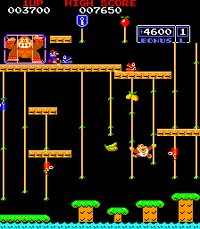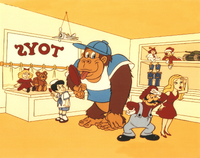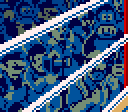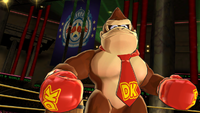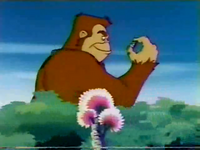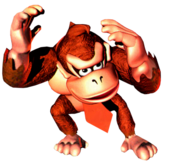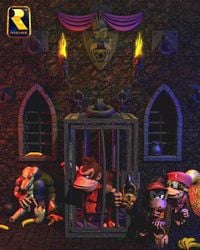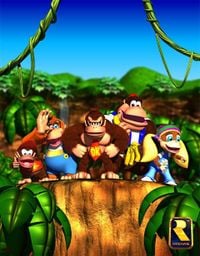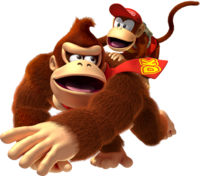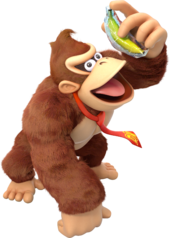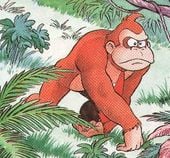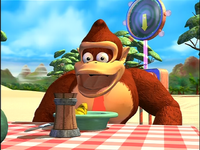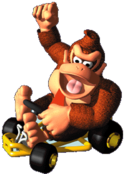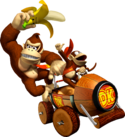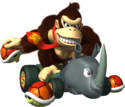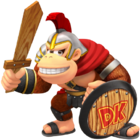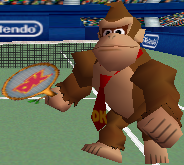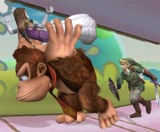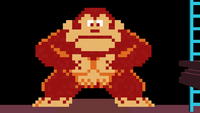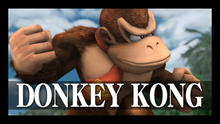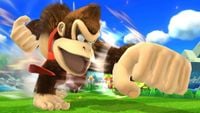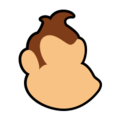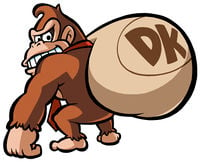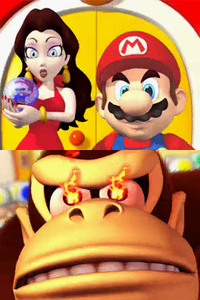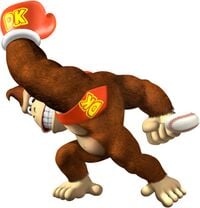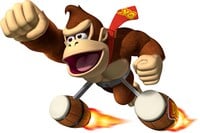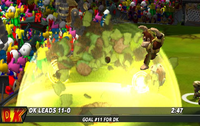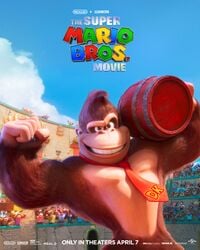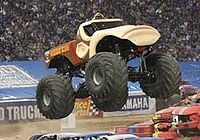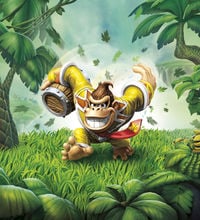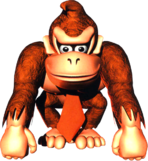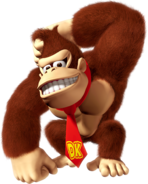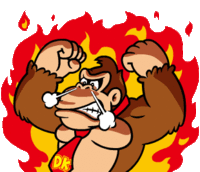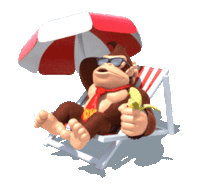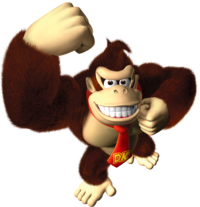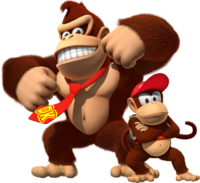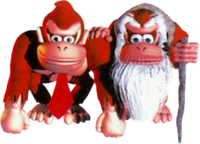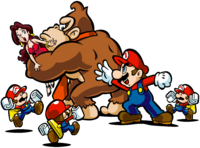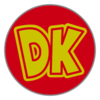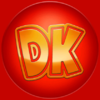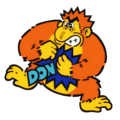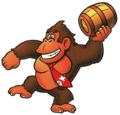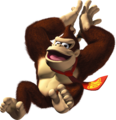Donkey Kong: Difference between revisions
mNo edit summary |
(→Speech) Tag: Mobile edit |
||
| Line 677: | Line 677: | ||
===Speech=== | ===Speech=== | ||
In the ''[[Donkey Kong (game)|Donkey Kong]]'' arcade game, the original Donkey Kong only spoke in growls as he took Lady (or [[Pauline]]) on top of a construction site, as well as when ascending further up the structure upon Mario completing a level (except for [[100m]]). ''[[Saturday Supercade]]'' depicted him with the ability to speak broken English in contrast to [[Donkey Kong Jr.]], his son. While he mainly verbalized realistic ape noises in-game provided by Mark Betteridge, the instruction manuals for the ''[[Donkey Kong Country]]'', ''[[Donkey Kong Land]]'' and ''[[Donkey Kong Country 2: Diddy's Kong Quest]]'' showed that the current Donkey Kong has the ability to speak rather intelligently, which was also seen during the ending of ''[[Donkey Kong Country 3: Dixie Kong's Double Trouble!]]''. Donkey Kong later spoke intelligibly in a few ''[[Club Nintendo (magazine)|Club Nintendo]]'' comics as well as ''[[Super Mario-Kun]]''. Donkey Kong first received voice acting in the [[Donkey Kong Country (television series)|1998 computer-animated ''Donkey Kong Country'' television series]], where he was portrayed by [[Richard Yearwood]]. Donkey Kong next received voice acting in ''[[Donkey Kong 64]]'', where he was portrayed by [[Grant Kirkhope]], a composer for [[Rare Ltd.]] and the ''Donkey Kong'' franchise. Here, Donkey Kong had a few lines where he spoke broken English while referring to himself in the third person. Grant Kirkhope would provide a mixture of cartoonish gorilla noises and actual words, including "Yeah!", "Cool", "Hey!", and "OK!". After 2006, [[Takashi Nagasako]] took over as Donkey Kong's voice actor, first heard in ''[[Mario Power Tennis]]'', though he mainly provided him with cartoonish gorilla noises, although he is able to say his name, "Let's go!", and "Yeah, hey!" In current games where Donkey Kong is intended to speak in full sentences, there is in-game text to signify what he is saying. In the early ''Mario Party'' games, ''Mario Kart 64'', ''Mario Kart Super Circuit'', ''Mario Tennis'', ''Mario Golf'', as well as the ''Super Smash Bros.'' series, Donkey Kong is instead given chimpanzee screams and realistic gorilla roars, respectively, instead of a voice actor; Donkey Kong's voice clips from the N64 era use the Chimpanzee Screeches and Vocalizes from The Hollywood Edge Sound Effects Library.<ref>https://www.whosampled.com/sample/515022/Nintendo-Character-Sound-Effects-The-Hollywood-Edge-Sound-Effects-Library-Chimpanzee-Screeches-and-Vocalizes/</ref> In ''The Super Mario Bros. Movie'', Donkey Kong, as all other Kongs, is fully capable of speech and can normally talk to non-Kong characters. | In the ''[[Donkey Kong (game)|Donkey Kong]]'' arcade game, the original Donkey Kong only spoke in growls as he took Lady (or [[Pauline]]) on top of a construction site, as well as when ascending further up the structure upon Mario completing a level (except for [[100m]]). ''[[Saturday Supercade]]'' depicted him with the ability to speak broken English in contrast to [[Donkey Kong Jr.]], his son. While he mainly verbalized realistic ape noises in-game provided by Mark Betteridge, the instruction manuals for the ''[[Donkey Kong Country]]'', ''[[Donkey Kong Land]]'' and ''[[Donkey Kong Country 2: Diddy's Kong Quest]]'' showed that the current Donkey Kong has the ability to speak rather intelligently, which was also seen during the ending of ''[[Donkey Kong Country 3: Dixie Kong's Double Trouble!]]''. Donkey Kong later spoke intelligibly in a few ''[[Club Nintendo (magazine)|Club Nintendo]]'' comics as well as ''[[Super Mario-Kun]]''. Donkey Kong first received voice acting in the [[Donkey Kong Country (television series)|1998 computer-animated ''Donkey Kong Country'' television series]], where he was portrayed by [[Richard Yearwood]]. Donkey Kong next received voice acting in ''[[Donkey Kong 64]]'', where he was portrayed by [[Grant Kirkhope]], a composer for [[Rare Ltd.]] and the ''Donkey Kong'' franchise. Here, Donkey Kong had a few lines where he spoke broken English while referring to himself in the third person. Grant Kirkhope would provide a mixture of cartoonish gorilla noises and actual words, including "Yeah!", "Cool", "Hey!", and "OK!". After 2006, [[Takashi Nagasako]] took over as Donkey Kong's voice actor, first heard in ''[[Mario Power Tennis]]'', though he mainly provided him with cartoonish gorilla noises, although he is able to say his name, "Let's go!", and "Yeah, hey!" In current games where Donkey Kong is intended to speak in full sentences, there is in-game text to signify what he is saying. In the early ''Mario Party'' games, ''Mario Kart 64'', ''Mario Kart Super Circuit'', ''Mario Tennis'', ''Mario Golf'', as well as the ''Super Smash Bros.'' series, Donkey Kong is instead given chimpanzee screams and realistic gorilla roars, respectively, instead of a voice actor; Donkey Kong's voice clips from the N64 era use the Chimpanzee Screeches and Vocalizes from The Hollywood Edge Sound Effects Library.<ref>https://www.whosampled.com/sample/515022/Nintendo-Character-Sound-Effects-The-Hollywood-Edge-Sound-Effects-Library-Chimpanzee-Screeches-and-Vocalizes/</ref> In ''The Super Mario Bros. Movie'', Donkey Kong, as all other Kongs, is fully capable of speech and can normally talk to non-Kong characters, where he is portrayed by Seth Rogen. | ||
===Personality=== | ===Personality=== | ||
Revision as of 09:49, October 22, 2023
- This article is about the character Donkey Kong. For other uses of the name "Donkey Kong", see Donkey Kong (disambiguation). For other uses of the moniker "DK", see DK (disambiguation).
| Donkey Kong | |
|---|---|
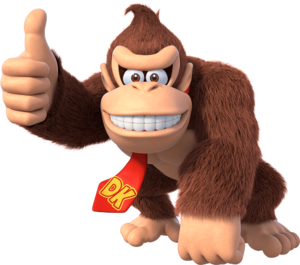 Artwork of Donkey Kong for Mario Party Superstars | |
| Species | Kong |
| First appearance | Donkey Kong (as the original Donkey Kong) (1981) Donkey Kong Country (as the current Donkey Kong) (1994) |
| Latest appearance | The Super Mario Bros. Movie (2023) |
| Latest portrayal | Takashi Nagasako (2004–present) Seth Rogen (English, 2023) |
- “My bananas and my buddy, Diddy Kong, they are gone! The Kremlings will pay! I'll hunt them down through every corner of my island, until I have every last banana from my hoard back!”
- —Donkey Kong, Donkey Kong Country
Donkey Kong, also known simply as DK, D.K., D. Kong,[1][2] or rarely Donkey, is a major character in the Super Mario franchise and the main protagonist of the Donkey Kong franchise. He is a powerful and carefree Kong that lives in Donkey Kong Island, and he likes to collect bananas and spend time with his friends, particularly his best friend and sidekick Diddy Kong. However, he has also been portrayed as an antagonist on multiple occasions, mainly in the Mario vs. Donkey Kong series.
The Donkey Kong Country series establishes that Donkey Kong is something of a title rather than a singular character, and that at least two separate Kongs have bore it. This includes Cranky Kong and the current Donkey Kong. After the 1994 Game Boy Donkey Kong, Cranky Kong retired the usage of the name, passing it on to his grandson to use in Donkey Kong Country and onward.[3] This has caused confusion and continuity issues, with certain games and miscellaneous pieces of media contradicting the identity of Donkey Kong in early titles and his relationship with Cranky Kong.
Creation
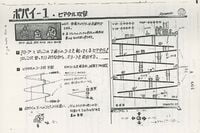
Donkey Kong's character design was created by Shigeru Miyamoto for the Donkey Kong arcade game, in which Donkey Kong kidnaps Mario's original girlfriend, Lady. Miyamoto says that he chose the name "Donkey" to reflect the character's stupidity,[4] while "Kong" was considered a generic term for large apes in Japan.[5] Miyamoto was later informed by Nintendo of America staff that the word "donkey" is not a synonym for "idiot" in English, but he decided to ignore this because he liked the name "Donkey Kong".[4] However, this is contradicted by the deposition he gave during Universal Studio's lawsuit against Nintendo. He stated that his proposals for Kong's first name were rejected and that he was unaware of who came up with it. Export manager Shinichi Todori's deposition revealed that he came up with the first name after trying to translate「頓馬」(tonma) into English. It was either Gunpei Yokoi or Hiroshi Yamauchi who gave the final approval for the name.[6][7] Excluding the title, the Japanese arcade instructions and flyer refer to him simply as「コング」(Kong).
The Donkey Kong Jungle Action Special states that Shigeru Miyamoto claims that Donkey Kong's character was inspired by the Beauty and the Beast fairy tale, though no further source or statement has been provided.[8] However, it is known that Donkey Kong took over the role of Bluto in a scrapped Popeye arcade game as the primary antagonist.
Donkey Kong's original appearance portrayed him as a villainous or confused ape with unequaled strength. In these games, Donkey Kong did not wear a tie. The 1994 Game Boy Donkey Kong was the first game to feature the tie (a red tie with the letters "DK" printed in white, later changed to yellow. However, with the release of Donkey Kong Country later that year, Donkey Kong was given a new personality. Donkey Kong's newer design by Kevin Bayliss was modeled after the Battletoads, particularly the sunken eyes;[9] additionally, when Steve Mayles had trouble modeling the mouth early on, Tim Stamper folded a flattened sphere and gave it depth, which was a technique reused for most characters such as Enguarde. Shigeru Miyamoto also supervised the development of the design process via fax, reminding Rare to include the tie and correcting the number of digits that should be on the hands and feet.[10] Donkey Kong Country also saw the appearance of the elderly Cranky Kong, who is described as the original Donkey Kong from the older arcade games. While the relationship of Donkey Kong and Cranky Kong has been inconsistent, most sources indicate that the current Donkey Kong is the grandson of Cranky Kong.
History
Donkey Kong series
Donkey Kong
Donkey Kong debuts in the arcade game of the same name, where he is the main antagonist. In the game, Donkey Kong was the pet gorilla of Mario,[11][12] but he escapes and angrily carries Mario's girlfriend, Lady, to the top of a construction site. He is pursued by Mario and attacks him by throwing barrels and creating living Fireballs. He is eventually chased to the top of the construction site, where Mario causes the girders supporting him to collapse, sending him plummeting to the ground. Later games, starting with Donkey Kong Country, establish the identity of Donkey Kong in his first arcade appearances as actually being Cranky Kong, with the title of "Donkey Kong" being later passed down to his grandson.
Donkey Kong Jr.
In Donkey Kong Jr., Donkey Kong is trapped by Mario as a punishment for kidnapping Pauline and stands guard next to his cage with a whip, and sends various enemies like Snapjaws and Nitpickers to prevent his son, Donkey Kong Jr., from freeing him. In the end, Donkey Kong Jr. defeats Mario and frees Donkey Kong.
Donkey Kong 3
In Donkey Kong 3, Donkey Kong returns as the main villain. In this game, Donkey Kong goes on a rampage inside a greenhouse, where a local exterminator named Stanley is called in to defeat him. Donkey Kong uses a system of ropes to lower himself to the greenhouse floor. When he reaches the floor, Donkey Kong can destroy the rest of the greenhouse and the game ends. If Stanley sprays Donkey Kong with insecticide three times, he runs away. In the final stage, Donkey Kong gets his head stuck in a beehive while running away. In the arcade version, upon getting his head stuck in a beehive, he tries to get the beehive off, but the beehive breaks in half, revealing his sting-swollen face.
Donkey Kong (Game Boy)
In the 1994 Game Boy rendition of Donkey Kong, Donkey Kong kidnaps Pauline again. However, instead of it ending at 100m, he instead manages to quickly retake Pauline and force Mario to pursue him for the rest of the game. His son Donkey Kong Jr. also aids his father in preventing Mario from rescuing her. Donkey Kong's mainly attacks by throwing a variety of objects at Mario, although there are sometimes stage hazards Donkey Kong can utilize, such as pressing a switch to make bridges appear and disappear.
Eventually, he is cornered at the Tower and falls off upon defeat; however, he is then enlarged by several Super Mushrooms, forcing Mario to defeat him by throwing barrels at his face. Donkey Kong then begs for help, with Donkey Kong Jr. rushing to his father's aid. The final credits photograph shows Pauline, Mario, Donkey Kong, and Donkey Kong Jr. at Rocky-Valley, indicating that they had become friends.
Game & Watch series
Donkey Kong
In the Donkey Kong game, Donkey Kong attempts to stop Mario from releasing Pauline by throwing barrels at him. He falls down when the four wires that are supporting Donkey Kong's platform are loosened.
Donkey Kong Jr.
In the Game & Watch version of Donkey Kong Jr., Donkey Kong is trapped in a cage and must be freed by his son by obtaining four keys.
Donkey Kong II
Donkey Kong II is a direct follow-up to Donkey Kong Jr.. Like the aforementioned game, Donkey Kong is trapped in a cage and must be saved by his son.
Donkey Kong 3
In the Game & Watch version of Donkey Kong 3, Donkey Kong releases bees that try to attack Stanley, who is protecting his plants. He is defeated when the bees are sprayed back at him by Stanley.
Donkey Kong Circus
In Donkey Kong Circus, Mario watches Donkey Kong juggle pineapples while balancing on a barrel. When Donkey Kong makes a mistake, Mario laughs at his performance.
Donkey Kong Hockey
In Donkey Kong Hockey, Mario and Donkey Kong compete in a game of ice hockey. In the game, Player 2 or the CPU is Donkey Kong.
Donkey Kong (coloring/activity books)
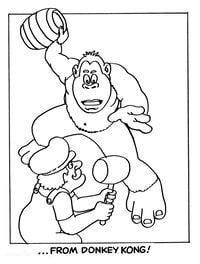
In the Donkey Kong activity books released in 1982 and 1983, Donkey Kong is an attraction at the Video Land Amusement Park. Because of his love for Pauline, he breaks free from his cage to kidnap her. This led to his confrontation with Mario, who also loves Pauline.
Saturday Supercade
Donkey Kong received his own show segment in the television cartoon series, Saturday Supercade. His Donkey Kong segment of the show received two seasons, and he starred alongside Mario and Pauline. In the show, Donkey Kong is a circus escapee and travels across the country with Mario and Pauline on his tail.
Punch-Out!! series
Punch-Out!!
In Punch-Out!! for the arcade, Donkey Kong can be found watching the fight in the audience along with Mario, Luigi, and Donkey Kong Jr.
Super Punch-Out!!
In Super Punch-Out!! for the arcade, Donkey Kong can be found in the audience again along with Mario, Luigi, and Donkey Kong Jr., this time with a different color scheme.
Punch-Out!! (Wii)
In Punch-Out!! for the Wii, Donkey Kong appears as a hidden bonus opponent, found initially in the game mode Mac's Last Stand. If the player fights Donkey Kong in that game mode, they can fight him at any time in Exhibition mode.
Captain N: The Game Master
Donkey Kong makes occasional appearances on Captain N: The Game Master. He is a giant, bestial monster that wears clothes. He likes to be left alone, and seeing people in his part of the jungle of Kongoland makes him violently angry. He is commonly manipulated by Mother Brain and her minions to do their bidding, though he will occasionally help the heroes fight a shared enemy. In the episode "The Lost City of Kongoland," he is shown living in a treehouse and sometimes wears a tie, something his video game counterpart would not be shown doing until four years after the episode aired. Donkey Kong also appears in the comics.
Nintendo Adventure Books
Donkey Kong appears in the sixth Nintendo Adventure Book, Doors to Doom, in a recreation of the original game where Mario and Luigi are trying to rescue Princess Peach instead of Pauline. If the Mario Bros. successfully reach the top of the tower, Donkey Kong is sent plummeting out of sight while Peach jabs him with her crown.
Mario Golf series
NES Open Tournament Golf
In NES Open Tournament Golf, a gorilla looking similar to Donkey Kong appears wearing a white outfit. His role is to tell the player how much money they have and when they reach certain milestones, as well as keep it.
Mario Golf (Nintendo 64)
Donkey Kong first appears as an unlockable playable character in Mario Golf for the Nintendo 64. He has a drive of 275 yards. Unique to Donkey Kong, he swings his golf club with one hand in the series.
Mario Golf: Toadstool Tour
Donkey Kong returns in Mario Golf: Toadstool Tour as a default playable character. He has a low height and a high Star Drive.
Mario Golf: Advance Tour
In Mario Golf: Advance Tour, Donkey Kong appears as a playable character in the Quick Play mode. He has a high Drive and Star Drive.
Mario Golf: World Tour
The next entry in the Mario Golf series, Mario Golf: World Tour, features Donkey Kong as a playable character. He has a high Drive, and his Challenge Mode Character Match course is DK Jungle.
Mario Golf: Super Rush
Donkey Kong reappears as a Power character in Mario Golf: Super Rush. His Special Shot is Burly Strike, while his Special Dash is the DK Dash.
Donkey Kong Country series
Years after the events of Donkey Kong 3, Donkey Kong relocated to Donkey Kong Island, where he grew old and was renamed to Cranky Kong. His grandson, also named Donkey Kong, forges lasting friendships with many of the other Kongs, including Diddy Kong, Dixie Kong, Funky Kong, and his girlfriend, Candy Kong.
Donkey Kong Country
In the backstory for Donkey Kong Country, Donkey Kong assigned Diddy Kong to guard his banana hoard at night. Later, the Kremling Krew overpowered Diddy and stole Donkey Kong's entire hoard. The next morning, Cranky Kong wakes up Donkey Kong and shows him that his entire banana hoard is missing. Donkey Kong is upset, also noticing that Diddy is missing, and goes on an adventure to find retrieve the banana hoard and rescue Diddy, who he rescues from a DK Barrel in the first level, Jungle Hijinxs.
Donkey Kong and Diddy adventure through six worlds, and are assisted by three other Kongs along their way: Cranky, Candy, and Funky. In some of the levels, Donkey Kong and Diddy are assisted by an Animal Friend, such as Rambi.
In gameplay, Donkey Kong can defeat Krushas and Klumps by jumping on them whereas Diddy cannot. Donkey Kong is less agile than Diddy, and one of his attacks is to roll into enemies (Diddy's equivalent to the move is performing a cartwheel). Donkey Kong can perform a Hand Slap on the ground to sometimes unearth a hidden item. Donkey Kong carries a barrel above him instead of holding it out in front like Diddy.
Donkey Kong and Diddy eventually reach the final destination, Gang-Plank Galleon, where they engage in a final boss battle against King K. Rool. The Kongs manage to defeat K. Rool and reclaim the whole banana hoard, thus ending their adventure.
Donkey Kong Country 2: Diddy's Kong Quest
In Donkey Kong Country 2: Diddy's Kong Quest, Donkey Kong does not appear as a playable character. The main plot involves Diddy and his girlfriend, Dixie Kong, having to rescue Donkey Kong from the Kremlings and Kaptain K. Rool on Crocodile Isle.
In the intro of the game, Donkey Kong is relaxing on the beach. Cranky Kong shows up, arguing that Donkey Kong should not take a rest because he is a video game hero. After some discussion, Donkey Kong asks Cranky to leave. During the day, the Kremlings ambush Donkey Kong, tie him up, and carry him up into The Flying Krock. K. Rool writes a note demanding the banana hoard as a ransom for Donkey Kong's return. On the beach, the Kong family discuss the incident. Diddy refuses to give up the banana hoard to the Kremlings, so he and Dixie go on an adventure to rescue him.
At the end of K. Rool's Keep, in Stronghold Showdown, Diddy and Dixie find Donkey Kong tied up in the chamber. As they celebrate over finding Donkey Kong, he gets carried up into The Flying Krock, and Diddy and Dixie rush after him (the entire event was replaced with a boss fight against Kerozene in the Game Boy Advance version).
During the boss level K. Rool Duel, Diddy and Dixie manage to enter inside the airship. They witness in shock as Kaptain K. Rool beats Donkey Kong, still tied up, with his blunderbuss. In parts of the battle, when K. Rool is knocked down, Donkey Kong falls into view, still attempting to break free from his ropes. At the end of the battle, Donkey Kong manages to break free, and he punches K. Rool out of the airship. In the Game Boy Advance version, a cutscene is shown of the Kongs escaping the Flying Krock just before it falls into the water.
Donkey Kong also appears in the 102% ending, after Diddy and Dixie defeat Kaptain K. Rool in the Lost World. He, Diddy, and Dixie witness as Crocodile Isle sinks underwater.
The plot for Donkey Kong Land 2 is the same as Donkey Kong Country 2: Diddy's Kong Quest's, although a simplified version.
Donkey Kong Country 3: Dixie Kong's Double Trouble!
In the backstory for Donkey Kong Country 3: Dixie Kong's Double Trouble!, Donkey Kong and Diddy go on a fishing trip in the Northern Kremisphere. After a few days, neither of the Kongs returned, causing Dixie to become worried, so she goes on an adventure to search for them with her toddler cousin, Kiddy Kong.
After a long adventure, Dixie and Kiddy discover that Baron K. Roolenstein (an alter-ego of K. Rool's) was behind the plot. She and Kiddy manage to defeat K. Rool and his robot invention, KAOS, which Donkey Kong and Diddy Kong are held captive inside. The two Kongs are freed, and Donkey Kong is impressed at Dixie and Kiddy for rescuing them.
Donkey Kong 64
- “He's the leader of the bunch, you know him well
He's finally back to kick some tail” - —DK Rap
In Donkey Kong 64, King K. Rool develops a doomsday machine, the Blast-o-Matic, inside Crocodile Isle and plans to destroy DK Isles with it. Due to the incompetence of his Kremling underlings, Crocodile Isle crashes into a rock, severely damaging the Blast-o-Matic. Squawks alerts Donkey Kong that all of his Golden Bananas were stolen and his four friends are kidnapped: Diddy Kong, Lanky Kong, Tiny Kong, and Chunky Kong, all of whom are locked behind cages throughout the island.
Donkey Kong discovers an isle attached to Crocodile Isle. Inside he meets K. Lumsy, an enormous Kremling who was locked up for not destroying the island. When DK promises to free him, K. Lumsy jumps for joy, opening up a pathway to the first level, Jungle Japes. In there, Donkey Kong finds Diddy Kong and frees him. Donkey Kong and his friends receive help from various characters during his adventure, including Funky Kong, Cranky Kong, Snide, Troff and Scoff. Starting with Angry Aztec, Candy Kong also joins in helping Donkey Kong and his friends.
Donkey Kong is a heavyweight, which makes him slow and strong. He is the strongest Kong, next to Chunky Kong. During his adventure, Donkey Kong learns a few unique abilities at Cranky's Lab: Strong Kong, Baboon Blast, and Gorilla Grab. Strong Kong allows him to be invincible, which is necessary for safely crossing stage hazards like lava or quicksand. Baboon Blast allows Donkey Kong to partake in a challenge involving him firing from a series of Barrel Cannons. Lastly, Gorilla Grab allows him to pull levers. The Coconut Shooter is Donkey Kong's personal weapon, given to him by Funky Kong, and it allows him to shoot out coconuts. His personal instrument is the bongos, given to him by Candy Kong. Donkey Kong's corresponding in-game color is yellow, making him the only character who can collect yellow bananas, Banana Bunch Coins, and blueprints.
As the other Kongs are rescued, they help Donkey Kong find his Golden Bananas and the Boss Keys to unlocking K. Lumsy's cage. At the end of their adventure, the five Kongs get in a final boss battle against K. Rool, set within a boxing arena.
Like all of the playable Kongs, Donkey Kong has four colors that the player can select in Monkey Smash mode. By default, DK has brown fur and a red tie; his other costumes include tan fur with a purple tie, orange fur with a yellow tie, and dark blue fur with a light blue tie.
This game also reveals that his weight is 800lbs.
Donkey Kong Country Returns
Both Donkey Kong and Diddy Kong return as playable characters in Donkey Kong Country Returns and the 3DS remake Donkey Kong Country Returns 3D.
Like Donkey Kong Country, the story also centers around Donkey Kong's banana hoard being stolen, this time by a different group of villains, the Tiki Tak Tribe. After being released from the Volcano, the tikis hypnotize the animals of Donkey Kong Island to steal the bananas. Donkey Kong and Diddy Kong witness from their treehouse as the banana hoard gets taken away, and Kalimba suddenly appears and knocks Donkey Kong back into his treehouse. Kalimba unsuccessfully attempts to hypnotize Donkey Kong, who is somehow immune to its hypnosis.
The first level, Jungle Hijinxs, is followed right after the cutscene. In the start of the level, Donkey Kong repeatedly beats Kalimba, kicks it out of his tree house, and starts his adventure.
Donkey Kong controls much like how he did in the earlier Donkey Kong Country games, being able to roll and Ground Pound. When paired with Diddy Kong, Donkey Kong can roll indefinitely and briefly hover when Diddy uses his Barrel Jet.
Together, Donkey Kong and Diddy travel throughout the island. They are assisted by Cranky Kong and the Tutorial Pigs during their adventure. The Kongs eventually enter inside the Volcano and battle the main villain, Tiki Tong. After defeating him, Donkey Kong and Diddy reclaim their banana hoard.
Donkey Kong Country: Tropical Freeze
Donkey Kong also returns as the main protagonist of Donkey Kong Country: Tropical Freeze and its Nintendo Switch port of the same name. In the introduction cutscene, the Kongs are in the treehouse celebrating Donkey Kong's birthday. Meanwhile, an arctic group of vikings, the Snowmads, make their way to conquer Donkey Kong Island. Just as Donkey Kong is about to blow out his candle, a cold wind comes in and blows it out. The Kongs go outside the treehouse to investigate and get blown away by the ice dragon to the Lost Mangroves. The ice dragon covers Donkey Kong Island in a freeze, and the Snowmads conquer it for their own. The four Kongs go on an adventure to return to Donkey Kong Island and reclaim it from the Snowmads.
Donkey Kong was given an updated appearance in the game (due to the Wii U's and Nintendo Switch's higher quality visuals). Donkey Kong's fur is a lighter brown, with more details and added texture, and the shape of his nose is different. In the game, Donkey Kong can be paired with Dixie Kong and Cranky Kong, aside from Diddy Kong. He also retains his rolling ability from Donkey Kong Country Returns.
After traveling through a chain of islands, the Kongs eventually return to Donkey Kong Island. They engage in a final boss battle against Lord Fredrik, set inside a volcano. The Kongs manage to defeat Lord Fredrik, and afterwards Donkey Kong blows a horn to melt away all the snow on the island.
Club Nintendo
He is also the main character in the Club Nintendo comic "Donkey Kong Country," which tells the story of the game of the same name: With Diddy Kong, he tries (and manages) to fetch the banana hoard back from King K. Rool.
During the events of the comic "Super Mario in Die Nacht des Grauens," published in the same magazine, he lives in a skyscraper in Brooklyn with many other Nintendo characters. Due to a contract signed by Wario, the skyscraper is invaded by several monsters. One of them, Chuckie, invades the Kongs' room while Donkey and Diddy are watching TV. They are terrified by the evil doll but get rescued by Mario, Link, and Kirby. Afterwards, Donkey claims that had he and Diddy defeated the monsters, they would have taken only "half of the time."
He once again appears as the main character in "Donkey Kong in: Banana Day 24." The Kongs have to save the world from freezing, since a giant UFO is pulling the Earth away from the sun. Together with Diddy, Dixie, Kiddy, and Cranky, Donkey enters a space shuttle and flies into space in order to talk to the aliens. As it turns out, the reason for them pulling away the Earth is that they mistake the planet for a giant coconut. When the Kongs bring them some bananas, they agree to return the Earth to its original position. In the comic, Donkey appears as the bravest of the Kongs, as he is the one to start talking to the aliens.
Donkey Kong Land series
Donkey Kong Land
Donkey Kong reappears in Donkey Kong Land, which takes place after the events of Donkey Kong Country. In the backstory, which is told in the game's instruction manual, Cranky Kong admits that Donkey Kong and Diddy Kong's previous adventure was more successful than he expected. Cranky, breaking the fourth wall, believes it was due to the Super Nintendo Entertainment System's graphical capabilities, so he bets with Donkey Kong and Diddy that they cannot finish an adventure on an 8-bit handheld, the Game Boy. The Kongs accept the bet, so Cranky arranges for the Kremling Krew to steal the Kongs' bananas again.
Donkey Kong and Diddy Kong travel through four worlds. At the end of the fourth world, Big Ape City, the two Kongs engage in a final boss fight against K. Rool in K. Rool's Kingdom. They manage to defeat K. Rool and thus complete their adventure on an 8-bit handheld.
Donkey Kong Land III
Donkey Kong does not appear in Donkey Kong Land III itself, making it the only Donkey Kong title that he does not appear in. However, he and Diddy are mentioned during the game's backstory, where they join a contest to find the Lost World. Dixie and Kiddy also hear about of the contest and decide to enter as well.
Donkey Kong Country: Rumble in the Jungle
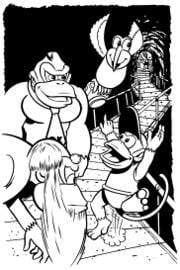
In the 1995 novel Donkey Kong Country: Rumble in the Jungle, Donkey Kong leaves his treehouse in the jungle with his friend Diddy Kong and grandfather Cranky Kong, after discovering that Funky Kong's plane has mysteriously crashed near Big Ape City. They traverse through the Tree Top Town on the edge of the forest, and Donkey Kong takes the lead in confronting and defeating a large group of Kremlings. Later, Donkey Kong uses his "extraordinary lung power" to cry for help from Squawks the Parrot when they find themselves trapped within a mountain cave. After reaching Big Ape City, Donkey Kong is angered to discover that the Kremlings are rebuilding a large factory which is releasing large amounts of pollution into the air. He finds a way for the Kongs to enter the factory by hiding in a Mine Cart, and they locate Funky within a cell. Donkey Kong uses a mini TNT Barrel to break open the cell door, and later uses a powerful shoulder charge to break open the door to the factory's cargo room.
Just like "climbing vines back in the jungle", Donkey Kong climbs a cable within an elevator shaft to reach the factory's defensive system. He encounters the most powerful Kremling, Krusha, who threatens to bring him to King K. Rool. Knowing that he is unable to defeat Krusha using strength alone, Donkey Kong tricks him into thinking that inside his backpack is a list of where to find all the Kongs on Donkey Kong Island. This gives him the chance to knock out Krusha using a barrel, and he proceeds to destroy the defense system. While escaping the factory in Funky's repaired plane, he and Diddy Kong decide to enter King K. Rool's zeppelin from the air and plant it with time-delayed TNT Barrels. After choosing to allow the "coward" King K. Rool to escape, Donkey Kong and Diddy re-enter the plane, and celebrate a victory as they watch the zeppelin fall and land on the factory, destroying it with an explosion.
Throughout the novel, Donkey Kong uses a range of physical attacks which were originally seen in the Donkey Kong Country game, including Barrel Rolls, Cartwheel Attacks and Hand Slaps. He also carries a large supply of miniature barrels and TNT Barrels in his backpack, which are utilized against the Kremlings and their weapons.
Donkey Kong Country television series
Donkey Kong is the main protagonist in the 1998 TV series Donkey Kong Country. In it, Donkey Kong is an anthropomorphic ape who, due to finding the Crystal Coconut in Inka Dinka Doo's temple, is predicted to be the future ruler of Kongo Bongo Island. Ever since, it has been made Donkey Kong's duty to guard the Crystal Coconut until the day it officially proclaims him ruler of the island. However, King K. Rool wants to steal the Crystal Coconut so that he can rule the island, and DK and his pals have to stop him and the Kremling Krew, as well as another villain, Kaptain Skurvy. On this show, Donkey Kong is depicted as somewhat of a slacker who loves bananas above all else, much like his portrayal in recent games. On this show, he is also bipedal as opposed to walking on all fours like he normally does, although he sometimes goes on all fours when running. This would carry over to Donkey Kong 64, though in that game, he stands on all fours when idle.
Mario Kart series
Mario Kart 64
Like Wario, Donkey Kong first appeared in the Mario Kart series in the Nintendo 64 game, Mario Kart 64 (replacing Donkey Kong Jr. from the previous installment). In this game, he is classified as a heavyweight character, along with Bowser and Wario. His personal track is D.K.'s Jungle Parkway.
Mario Kart: Super Circuit
Donkey Kong reappears as a heavyweight character in the Game Boy Advance game, Mario Kart: Super Circuit. Again, Wario and Bowser join him as the heavyweight characters. Donkey Kong does not have his own course in this game.
Mario Kart: Double Dash!!
Donkey Kong appears in Mario Kart: Double Dash!!, along with another Kong, Diddy Kong. Donkey Kong, again, is classified as a heavyweight character. Besides Bowser and Wario, Petey Piranha and King Boo also appear as heavyweight characters. Donkey Kong also gets his own personal course, DK Mountain. He and Diddy share a special item, the Giant Banana. Donkey Kong's kart is the DK Jumbo.
Mario Kart Arcade GP
Donkey Kong appears in the arcade game, Mario Kart Arcade GP. He has four special items. They are the Barrel, the 10T Hammer, the Giant Banana, and the Conga. Like most of the characters, Donkey Kong has his own cup, which is simply named DK Cup. In this cup, two of Donkey Kong's personal tracks appear, DK Jungle and Bananan Ruins.
Mario Kart DS
Donkey Kong appears in the Nintendo DS game, Mario Kart DS. Like with his past appearances, Donkey Kong is a heavyweight character, but in this game, he is the lightest heavyweight; the other heavyweight racers include Wario, Bowser, and R.O.B.. Donkey Kong has three personal karts, the Standard DK, the Rambi Rider, and the Wildlife, and he has one personal course, DK Pass.
Mario Kart Arcade GP 2
Donkey Kong appears in the second Mario Kart arcade game, Mario Kart Arcade GP 2. He is a power racer, along with Wario and Bowser. The DK Cup from the first game also returns with the same courses.
Mario Kart Wii
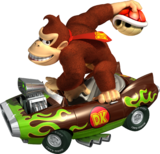
Donkey Kong also appears in the Wii game, Mario Kart Wii. He is classified as a large-sized character, along with Wario, Waluigi, Bowser, King Boo, Rosalina, Funky Kong, and Dry Bowser. He has three courses in this game (with two of them being retro courses): DK Summit, N64 DK's Jungle Parkway, and GCN DK Mountain. Donkey Kong receives a small boost of weight, acceleration, and handling, along with a small mini-turbo boost in this game.
Mario Kart 7
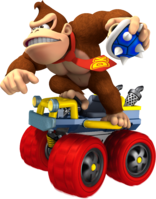
Donkey Kong appears as a racer again in the Nintendo 3DS title, Mario Kart 7, and has his own personal course, DK Jungle. He is classified as a Cruiser-type character in this game, and his speed, weight, and off-road stats are given a slightly above average boost.
Mario Kart Arcade GP DX
Donkey Kong also appears as a racer again in Mario Kart Arcade GP DX. He is once again a heavyweight racer and the Donkey Kong Cup becomes the Don-chan Cup.
Mario Kart 8 / Mario Kart 8 Deluxe
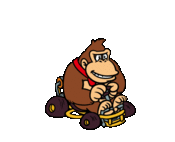
Donkey Kong appears in Mario Kart 8, where he is once again a playable character. His fur has a similar texture as in Donkey Kong Country: Tropical Freeze. While the official website states that he is a heavyweight, Donkey Kong is actually a lighter heavyweight, sacrificing some speed and weight to boost acceleration, handling, and traction. He shares this trait with Waluigi, Rosalina, Roy Koopa and Link. He is the Staff Ghost for Thwomp Ruins and 3DS DK Jungle.
Donkey Kong also owns a brand of sports drink which appears as a sponsor in the game, called Burning DK.
Donkey Kong returns in the Nintendo Switch port Mario Kart 8 Deluxe, where he now shares stats with only Waluigi and Roy.
Mario Kart Tour
Donkey Kong appears in Mario Kart Tour as a playable character. He is available as a Super driver in said game, with the Giant Banana returning as his special skill. He also has his self-named cup in the game, as well as a duel tour against Bowser. He also has a High-End gladiator-themed variant named Donkey Kong (Gladiator) that debuted in the Night Tour and is assigned the Boomerang Flower special skill.
Game Boy Camera
Donkey Kong makes a cameo as a stamp for photos in the Game Boy Camera peripheral.
Mario Party series
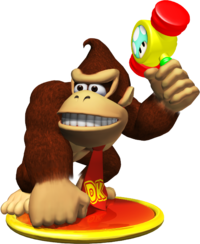
Donkey Kong is a playable character in all of the Mario Party games up until Mario Party 4.
The Mario Party 3 instruction booklet claims that Donkey Kong's favorite item is the Reverse Mushroom. His default partner in Duel Mode is Whomp.
Starting in Mario Party 5, he leaves the playable character roster but gains his own space. He is basically the opposite of Bowser, since when a character lands on his space, something good happens. But when a Koopa Kid lands on his space in story mode, he acts surprised and DK punches him, making the Koopa Kid lose half of his coins. He is playable in Super Duel Mode only, where he must be unlocked by beating him in Hard Competition.
In Mario Party 4 and Mario Party 5, just like Peach and Wario, he has two losing animations while the others only have one.
In Mario Party DS, Donkey Kong is the primary feature of his own board, DK's Stone Statue. During story mode, Donkey Kong is turned to stone by a Dry Bones while he and Diddy run to Bowser's Castle after being invited to a banquet hosted by him. The player has to win the game and beat the Dry Bones to free Donkey Kong. The ape then runs away to the castle. Upon arriving, Donkey Kong accidentally bumps into Bowser, knocking the Minimizer out of his hands which DK then destroys by accidentally stepping on it, allowing a shrunken Mario and his crew to revert to their normal size. At the end, he is seen with Diddy enjoying the meals Bowser had prepared as traps for the 8 "party characters".
In Mario Party 9, Donkey Kong appears as the "boss" of his own board, DK's Jungle Ruins. His boss minigame is called DK's Banana Bonus. During the minigame, Donkey Kong tosses Golden Barrel Cannons into the area, allowing the players to access banana bunches that are higher up.
Donkey Kong returns as a playable character in the Wii U title Mario Party 10, marking his first playable appearance in the series since Mario Party 4.
Donkey Kong is also playable in Mario Party: Star Rush, marking his first appearance as an unlockable playable character (not counting Super Duel Mode in Mario Party 5) and his second appearance as an unlockable playable character in the series since Mario Party 5. He can be unlocked if players earn enough part points to reach level 8 or if they scan a Donkey Kong amiibo. In Toad Scramble, he can break barrels to earn coins. His Brawny Dice Block has a 1 out of 3 chance to roll a 10, but other than that it will return a 0.
Donkey Kong appears in Mario Party: The Top 100 as a non-playable opponent in Jump, Man and Vine Country, both minigames returning from Mario Party 7.
Donkey Kong returns in Super Mario Party as an unlockable playable character, unlocked by completing three different courses in River Survival, then talking to him in the Party Plaza. Every playable character in this game has a unique Dice Block; in Donkey Kong's case, three of its faces display a 0, two of its faces display a 10, and one face gives him five coins (without moving).
Donkey Kong reappears as a playable character in Mario Party Superstars marking his first appearance as a starting playable character since Mario Party 10.
Mario Tennis series
In the Mario Tennis series, Donkey Kong appears as a playable Power-type character in most titles, the only exception being Mario's Tennis where Donkey Kong Jr. is playable.
In Mario Tennis for the Nintendo 64's intro, Donkey Kong participates in the tournament, where he loses to Mario (allowing the latter to advance to a semi-finals match against Yoshi). His doubles partner is Donkey Kong Jr., but if he is not unlocked yet, Donkey Kong's doubles partner is Yoshi instead.
Donkey Kong appears in Mario Power Tennis as a playable character. His offensive power shot is the Barrel Cannon Blast, and his defensive power shot is the Boomerang Banana Return. When Donkey Kong wins the championship, Toad brings him the trophy, and he grabs it with Toad still holding on. He waves it around, shaking up Toad in the process. When he finally stops, Toad faints, and Donkey Kong scratches his head. Donkey Kong's taunt is showing muscles and his doubles partner is Diddy Kong.
In Mario Tennis Aces, Donkey Kong reappears as a playable character. He also appears in the adventure mode, where he blocks the entrance to Piranha Plant Forest until the player completes the tutorials at Bask Ruins. When the player beats the tutorials, he challenges Mario to a match of tennis. When the player beats him then, he allows the player to pass.
Super Smash Bros. series
| Super Smash Bros. fighter Donkey Kong |
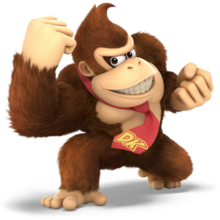
|
| Game appearances |
|---|
| Super Smash Bros. Super Smash Bros. Melee Super Smash Bros. Brawl Super Smash Bros. for Nintendo 3DS Super Smash Bros. for Wii U Super Smash Bros. Ultimate |
| Special moves |
| Neutral: Giant Punch Side: Headbutt Up: Spinning Kong Down: Hand Slap Final Smash: Konga Beat (Brawl, for 3DS / Wii U); Jungle Rush (Ultimate) |
| Battle entrance |
| Donkey Kong explodes out of a DK Barrel. |
Donkey Kong is playable in all five Super Smash Bros. games. Donkey Kong is always, as expected from a heavyweight, one of the strongest characters in the games. When he picks up a character, he also has the power to carry them a short distance, which is something that none of the other characters can do. He can also carry large objects, such as barrels and crates, without having his speed hindered.
Donkey Kong's special moves are Giant Punch, a punch that can be charged to increase its power, Headbutt, which has him headbutt his opponents into the ground, Spinning Kong, which has him spin and lets him momentarily float, and Hand Slap, which has him repeatedly stamp on the ground. For his Final Smash, he uses Konga Beat, pulling out two bongos and tapping them in time to the beat of Donkey Kong Country's first level, with each tap sending shockwaves that deal damage to opponents.
Donkey Kong is unique from other heavyweights; though he is unsurprisingly strong, he is also fast for a character of his weight. His combination of power, speed, and good range from his size and long arms contributes to making him arguably a versatile character to use throughout the Smash games.
Even though Donkey Kong is a Super Mario franchise character, his emblem is the DK symbol, which represents his own franchise. Unlike in the Mario series titles, Donkey Kong is given a gorilla voice for the Super Smash Bros. series. This is even more noticeable in Super Smash Bros. Brawl.
Super Smash Bros.
Template:Main-external In Super Smash Bros., Donkey Kong is a default character. In Classic Mode, the player must fight Giant Donkey Kong (shortened in-game to Giant DK), where they are provided two partners to help. It is the only match where the player is assisted by two fighters instead of one. As with other giant characters, Giant Donkey Kong is more resistant to knockback and can withstand around 350% damage before being knocked off the stage. Donkey Kong is the heaviest character in this game, weighing 141 units; however, he is somewhat sluggish, though his moves boast very high power.
Super Smash Bros. Melee
Template:Main-external Donkey Kong is also a playable character in Super Smash Bros. Melee. Once again, he is a default character.
In the new one-player mode, Adventure, the player must first fight two Tiny Donkey Kongs and then fight Giant Donkey Kong at Jungle Japes. By picking up a Super Mushroom, Donkey Kong can become larger briefly, before reverting to normal. In Giant Melee, the player can play as Giant Donkey Kong or fight against him. Similar to Super Smash Bros., Donkey Kong is one of the possible giant opponents who appears in stage 5 of Classic Mode, and is fought at Jungle Japes.
Giant Donkey Kong appears in two events of Event Mode:
- In Event 2, the player plays as Giant Donkey Kong, whose objective is defeating Tiny Donkey Kong
- In Event 25, the player must defeat Giant Donkey Kong using Giant Bowser.
Donkey Kong's weight is decreased from 141 units to 114, no longer making him the heaviest character in the game; instead, that title goes to fellow heavyweight Bowser. As compensation, however, Donkey Kong's movement and attack speed are both much faster, while his moveset receives a mix of buffs and nerfs. Starting from Super Smash Bros. Melee, Donkey Kong is a speedy heavyweight with decent combo ability.
Super Smash Bros. Brawl
Donkey Kong reappears as a playable character in Super Smash Bros. Brawl. His moves are carried over from Super Smash Bros. Melee, and he, like other characters, is given a Final Smash, his being the Konga Beat, most likely inspired by the games Donkey Konga and Donkey Kong: Jungle Beat. Some even go as far to say Donkey Kong's Final Smash is based on his instrumental attack from Donkey Kong 64, in which he uses a pair of bongos to create a shock-wave that can defeat any enemy on which it is used, except bosses (mainly because they cannot be used in any boss battles). Donkey Kong also gets a new white recolor. Donkey Kong's weight is slightly increased to 116 units from 114.
An 8-bit Donkey Kong appears on the 75 m stage (which is based on the third level of the original Donkey Kong). Touching him will harm the player.
Donkey Kong appears in several events, usually in giant form.
- In Event 9: "The Monster beneath the Earth", Giant DK is a hidden opponent. If the player does not KO the two Diddy Kongs fast enough, Giant DK must be fought as well.
- In Event 22: "Monkeys Unite", Giant Donkey Kong is Diddy Kong's partner in a fight against Sheik and Lucario.
- In Event 27: "Three-Beast Carnage", Giant Donkey Kong is among the three giant opponents fought by R.O.B., along with Giant Bowser and Giant Charizard.
Like Super Smash Bros. Melee, Donkey Kong briefly turns larger from using a Super Mushroom. In Giant Brawl, the successor to Giant Melee, the player can either play as Giant Donkey Kong or fight against one.
Ironically, despite his common appearances in Super Smash Bros.'s 1P Game as well as Super Smash Bros. Melee's Classic Mode, Donkey Kong does not appear in Classic Mode as a giant opponent. He shares this trait with the Zelda characters and Diddy Kong.
The Subspace Emissary
The Koopa Troop and Bowser steal Donkey Kong's banana hoard. As a Hammer Bro drives a car which contains all the bananas of Donkey Kong, Donkey Kong watches it from a cliff. Hammer Bro and the Goombas aboard the car spot Donkey Kong and shoot Bullet Bills at him. However, Diddy Kong comes out from a bush, and, with his Peanut Popguns, shoots the Bullet Bills. Donkey Kong and Diddy Kong then follow the Hammer Bro to retrieve the banana hoard. After finding their bananas, Bowser appears from behind with a Dark Cannon. As Bowser charges the cannon, Donkey Kong, realizing the danger, charges his Giant Punch. He then launches Diddy to the sky and out of harm's way, sacrificing himself in the process as Bowser shoots him with the Dark Cannon and turns him into a trophy. Later, Diddy Kong, who (forcefully) enlisted the help of Fox McCloud and Falco Lombardi, sees a ship carrying Donkey Kong's trophy form to a mysterious floating island. Falco then follows it with his Arwing and takes the little Kong with him. He then drops him, and Diddy gets on his Rocket Barrel, takes out his Popguns, and shoots the ship. After seeing this, Captain Falcon and Captain Olimar decide to help him and jump to the ship. Diddy frees Donkey Kong, and all four fight the Primids and other enemies.
The ship takes them inside a factory producing Subspace Bombs, and they encounter various R.O.B.s that live on the island. They later meet up with Pikachu and Samus Aran and see the Ancient Minister and a plethora of R.O.B.s. After Ganondorf manipulates the R.O.B.s into activating all of the Subspace Bombs, the Ancient Minister is shown to be R.O.B., the leader of all the lesser R.O.B.s who were forced to work for the Subspace Army. R.O.B. then fights alongside the others. Donkey Kong carries R.O.B., who refuses to leave his kind behind to perish, as they all flee to escape the doomed island on Captain Falcon's summoned Falcon Flyer. Meta Ridley then appears and follows behind to impede group's escape, forcing DK and his group to fight him. After that, they all meet up with the other heroes.
Donkey Kong and the other smashers enter Subspace and meet Tabuu, who turns everyone into trophies with his Off Waves. However, King Dedede had anticipated this and created badges that revived certain fighters back into their original forms without having to touch them. With his team, consisting of Luigi and Ness, Dedede rescues Donkey Kong and most of the others, although some of them are rescued by Kirby. They also recruit Bowser, Ganondorf, and Wario after they are informed about Tabuu. At the end of the Great Maze, Sonic the Hedgehog shows up and helps weaken Tabuu's Off Waves so that Donkey Kong and the others are able to beat him.
Super Smash Bros. for Nintendo 3DS / Wii U
Donkey Kong returns as a playable character in Super Smash Bros. for Nintendo 3DS and Super Smash Bros. for Wii U. His moveset has remained largely intact, but has nevertheless received a few noticeable changes, most notably his unique forward throw and Final Smash; Donkey Kong's weight is also increased from 116 units to 122. Like the majority of the cast (DLC fighters notwithstanding), each of Donkey Kong's special moves now possess two variants. Giant Punch has Lightning Punch and Storm Punch; Headbutt has Jumping Headbutt and Stubborn Headbutt; Spinning Kong has Chopper Kong and Kong Cyclone; and Hand Slap has Focused Slap and Hot Slap.
Super Smash Bros. Ultimate
Template:Main-external Donkey Kong appears as a playable character in Super Smash Bros. Ultimate. He has a new Final Smash, Jungle Rush, which involves him rapidly punching an opponent, as a reference to his attack method in Donkey Kong Jungle Beat. Donkey Kong is more expressive; when he charges his Giant Punch, he starts scowling, and using it in the air no longer makes him helpless. He is heavier, tying with King Dedede in weight, and Headbutt now gives Donkey Kong super armor for a short time. His recovery is also extended by the reintroduction of directional air dodge, can use any ground attack out of a run, and use any aerial attack while holding on the ladders officially called a "ladder attack". However, Giant Punch has more ending lag and Aerial Spinning Kong is weaker. His Classic Mode is titled "Journey to New Donk City". Donkey Kong's down tilt is officially nicknamed the Slouch Slap while his forward throw is referred to as Kong Carry. His weight has been further increased; however, he is no longer the second heaviest fighter in the game, instead giving up that title to his arch-nemesis, King K. Rool. Donkey Kong is tied with King Dedede for the third heaviest fighter.
Owing to King K. Rool's ties to Donkey Kong, Donkey Kong appears alongside Diddy Kong in K. Rool's debut trailer for Super Smash Bros. Ultimate. Specifically, Donkey Kong lounges lazily in his tree house after eating some bananas while watching various video game heroes confronting their respective nemeses on his TV, only to be startled by quakes before looking outside with Diddy to investigate. They then see an ominous and familiar shadow, only for it to be revealed to be King Dedede wearing a cape and King K. Rool's mask, to their surprise. King Dedede then proceeds to laugh at the practical joke he played on them, only for him to be smacked upside the head and knocked away by the actual King K. Rool, much to Donkey and Diddy Kong's horror, with King K. Rool roaring. In the ending of the trailer, Donkey Kong is knocked backwards, only to proceed to charge at his arch-nemesis on all fours, with King K. Rool doing the same in kind before proceeding to have their fists make contact with each other with enough force as to cause a shockwave to be emitted throughout the jungle.
Similarly, Donkey Kong also appears in Banjo & Kazooie's reveal trailer. Much like the King K. Rool trailer, Donkey Kong lounges around in his tree house eating bananas and watching TV, with Diddy Kong and a sleeping King K. Rool also present. A Jiggy bounces past the three, catching the Kongs' attention. After Diddy wakes King K. Rool up, the three look outside and see what appear to be the silhouettes of Banjo and Kazooie, but turn out to be Duck Hunt playing a prank on them, to their surprise. Duck Hunt proceed to laugh at this joke played on the Kongs and Kremling, only for the dog and duck to be knocked away from above by the real Banjo and Kazooie, holding their respective namesake instruments. This causes the Kongs and King K. Rool to celebrate. Near the end of the trailer, Donkey Kong can be seen in the background as Banjo and Kazooie perform a victory pose.
In the Adventure Mode, World of Light, Donkey Kong is present when he and other fighters oppose their ultimate enemy, Galeem. Although Donkey Kong is not shown to be hit by Galeem's beams directly, he, like many other fighters, except Kirby, is imprisoned in the World of Light. Donkey Kong is found in the jungle segment of the Light Realm, on a space that looks like the treehouse he lives in. Donkey Kong, upon being defeated, joins the party and fight Galeem.
A giant Donkey Kong based on the one from the original Super Smash Bros. also appears as the final opponent of Jigglypuff's route, due to its route being a callback to the original game.
Classic Mode route
By completing Donkey Kong's Classic Mode route, it is possible to unlock Bowser, Pokémon Trainer, Rosalina & Luma, King Dedede, Sheik, Greninja, Diddy Kong, and Duck Hunt.
Donkey Kong's Classic Mode route initially has him fight Diddy Kong, who joins him as a partner in all subsequent battles. Together, they fight opponents who live in urban settings, with their penultimate battle being against the Mario Bros. The penultimate battle alludes to the rivalry between Donkey Kong and Mario.
On a side note, before the version 3.0.0 update, Donkey Kong was the only character to face Master Hand and Crazy Hand as their Classic Mode route's final boss on the Ω form of a stage different from Final Destination. As of version 3.0.0, however, this trait is now shared with Joker and Sephiroth, as their final rounds take place in the Ω form of Mementos and Northern Cave.
| Journey to New Donk City | ||||
|---|---|---|---|---|
| Round | Opponent(s) | Rule | Stage | Song |
| 1 | Diddy Kong | Kongo Jungle | Jungle Level (64) | |
| 2 | King K. Rool | Team Battle (Ally: Diddy Kong) |
Kongo Falls | Gang-Plank Galleon |
| 3 | Wario, Captain Falcon | Team Battle (Ally: Diddy Kong) |
Pilotwings | Gear Getaway |
| 4 | Ness, Lucas | Team Battle (Ally: Diddy Kong) |
Onett | The Map Page / Bonus Level |
| 5 | Inkling Girl, Inkling Boy | Team Battle (Ally: Diddy Kong) |
Moray Towers | Donkey Kong / Donkey Kong Jr. Medley |
| 6 | Mario, Luigi | Team Battle (Ally: Diddy Kong) |
New Donk City Hall | New Donk City |
| Final | Master Hand, Crazy Hand (intensity 7.0 or higher) | Team Battle (Ally: Diddy Kong) |
New Donk City Hall (Ω) | Master Hand Master Hand / Crazy Hand (intensity 7.0 or higher) |
Donkey Konga series
Donkey Konga
In Donkey Konga, Donkey Kong discovers a magical set of bongos on a beach. Once Cranky Kong realizes his grandson's potential for being a professional, Donkey Kong and Diddy Kong set out to become famous. On their travels, they revisit many locales and play popular songs through cooperative performances and musical face-offs.
Donkey Konga 2
In Donkey Konga 2, when Dixie Kong joins Donkey and Diddy for a practice session, the trio realizes their potential for musical chemistry. Shortly after, they set out on another tour, which is very similar to Donkey and Diddy Kong's first one. However, they change up their song list to include current popular songs of the time.
Mario vs. Donkey Kong series
Mario vs. Donkey Kong
In the opening for Mario vs. Donkey Kong, Donkey Kong is channel surfing when sees a commercial for the new Mini-Mario toy. Desiring one for himself, Donkey Kong rushes to the local toy store, only to find that they are sold out. However, he notices the Mario Toy Company building nearby, and he breaks in and steals a sack full of the Mini-Marios, which makes Mario chase him to get the toys back. Donkey Kong is fought at the end of each world, after Mario has collected all of the Mini-Marios in the world. Depending on the world, Donkey Kong uses several tactics during his battles.
After a while of being chased, Donkey Kong checks the sack, only to see that it is entirely empty. Mario, the toys, and three Toads laugh at him. Enraged, Donkey Kong grabs the Toads and climbs up a nearby a building with them. After Donkey Kong is defeated again, he falls off the building, only to land on a truck containing several Mini-Marios, which he decides to steal. Donkey Kong is then fought at the end of each world once more, though his arenas are variants of their original versions. After Mario defeats Donkey Kong in the final battle against his robot, Mario gives Donkey Kong his own Mini-Mario toy.
Mario vs. Donkey Kong 2: March of the Minis
In the sequel, Mario vs. Donkey Kong 2: March of the Minis, Donkey Kong is an employee of the Mario Toy Company. Pauline, Mario's VIP guest for the opening of Super Mini Mario World, chooses Mario's Mini Mario over Donkey Kong's Mini Donkey Kong. This enrages Donkey Kong, leading him to kidnap Pauline. Donkey Kong appears as the boss fought at the end of the first eight floors of the game, as well as the final boss fought on the Roof and the hidden boss fought in B1 and B2 in DK's Hideout. In the Ending movie, Donkey Kong appears dejected before Pauline shows Donkey Kong her appreciation by kissing the DK toy he gave her.
Several of Donkey Kong's voice clips in this game are recycled from Donkey Kong 64, Mario Power Tennis, and Donkey Kong Jungle Beat.
Mario vs. Donkey Kong: Minis March Again!
In Mario vs. Donkey Kong: Minis March Again!, Donkey Kong is waiting in a line to buy a ticket for the opening of the Super Mini Mario World theme park. However, by the time he reaches the ticket booth, the tickets are sold out. Donkey Kong becomes furious over this, and therefore decides to break in while taking Pauline with him. Mario brings out his Mini Marios and chases Donkey Kong through all the theme park's floors. Later, when Mario rescues Pauline, Donkey Kong turns off the lights and escapes with Pauline through a nearby window. After four more floors are cleared, Mario walks into a room to see Donkey Kong, Pauline, and all the Toads smiling. Pauline reveals that it was all a test for the Mini Marios, who all passed with flying colors, much to Mario's surprise.
Mario vs. Donkey Kong: Mini-Land Mayhem!
In Mario vs. Donkey Kong: Mini-Land Mayhem!, Donkey Kong arrives at the newly-opened Mini-Land to desperately get a Mini Pauline, only to find out that he is the 101st guest to arrive and it sold out after 100. Donkey Kong gets incredibly mad and, in his rage, kidnaps the real Pauline, forcing Mario and his force of Mini Marios to rescue her. After Donkey Kong is defeated in Final Ferris Wheel, Pauline welcomes Mario and is ready to give him a hug, but Donkey Kong suddenly appears and kidnaps her again. After defeating him for a second time in Plus Mode, it is shown Donkey Kong is given a Mini Pauline by Mario and the trio rides the Ferris wheel together.
Mario and Donkey Kong: Minis on the Move
In Mario and Donkey Kong: Minis on the Move, Donkey Kong is one of the organizers of the carnival and sometimes appears with Pauline to congratulate the player.
Mario vs. Donkey Kong: Tipping Stars
In the intro of Mario vs. Donkey Kong: Tipping Stars, Donkey Kong is shown kidnapping Pauline, which causes Mario and the Mini Marios to chase him. In the end, the kidnapping was revealed to be a plan to lure Mario to a surprise party that is hosted by Donkey Kong, Pauline and a few Toads.
Donkey Kong Jungle Beat
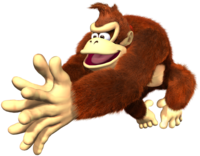
In Donkey Kong Jungle Beat, Donkey Kong travels to the Banana Kingdom to take down the possessed Dread Kong who ruled it, and then does the same for the other sixteen kingdoms nearby. Eventually, he fight and defeats the evil Cactus King, freeing the other Kongs of his curse and presumably allowing them to resume their duties.
DK series
DK: King of Swing
Donkey Kong has more work to do during DK: King of Swing. It is time for the annual Jungle Jam, a festival for the Kongs. However, King. K. Rool returns and steals all of the medals needed to have the festival. Donkey Kong and Diddy Kong go after him to get the medals back. In the end, they defeat K. Rool, and the festival is celebrated.
DK: Jungle Climber
In DK: Jungle Climber, Donkey Kong, along with Diddy, Dixie, Cranky, Wrinkly, Funky, and Candy, is resting on the beach when Diddy notices a giant banana. Donkey Kong, Diddy, and Cranky go up to the top and find a Banana Ship. Donkey Kong fights this spaceship and finds Xananab. They find that K. Rool and the Kremlings have escaped with his five Crystal Bananas, and he needs them back. Donkey Kong and friends agree, and the four travel through the islands, going through wormholes and other lands, such as Glass Labyrinth, Toybox, and Veggie Patch. At the end of each island, Donkey Kong fights one of K. Rool's assistant Kremlings and eventually defeats the third Kremling. K. Rool then flees to the King Kruiser IV. Donkey Kong chases him and eventually reaches K. Rool's spaceship. There, he defeats the fourth Kremling as K. Rool goes through a wormhole. Donkey Kong follows, and the group lands on Xananab's home planet. There, they fight K. Rool, which is no easy task. Eventually, the DK Crew once again wins, and Donkey Kong, Diddy, and Cranky get to eat as many bananas as they desire.
Mario Baseball series
Mario Superstar Baseball
Donkey Kong appears as a fully playable default character in Mario Superstar Baseball as the team captain of the DK Wilds with Diddy Kong as subcaptain and his home stadium is the Donkey Kong Jungle. Unlike most batters, Donkey Kong uses a boxing glove to punch the ball. There is a small contact point between the ball and the glove, making it more difficult for Donkey Kong to land a hit, but Donkey Kong has great hitting power. Donkey Kong has also above-average pitching. Donkey Kong has below average running and fielding stats, however. In this game, DK has good chemistry with Diddy Kong, Dixie Kong, and Petey Piranha.
Donkey Kong's special ball and bat is called the Banana Ball. This makes the pitched or hit ball have a banana-like trajectory. Donkey Kong's player abilities include Clamber, which allows him to climb walls and catch high-flying balls that would otherwise be fair or home-runs. He also has Laser Beam, which makes his throws from outfield to home quick, potentially preventing runners from scoring a point.
During the opening cinematic, Donkey Kong is seen receiving a flyer with Bowser depicted on it as other known team captains receive the same method. As Donkey Kong's team faces off against Wario's team, Donkey Kong climbs the wall in an attempt to fetch a fly ball, but a Chain Chomp attacks him, foiling his plans. Donkey Kong is in league with Wario's team against Mario at Mario Stadium, where Donkey Kong is seen trying to make a reception at home plate, but Mario evades and scores. Donkey Kong later hits the ball with his boxing glove, only for Luigi to rob his chance of a home run.
Mario Super Sluggers
In Mario Super Sluggers, Donkey Kong is mostly unchanged. He still uses a boxing glove to bat. His Star Pitch and Star Swing are also altered to Barrel Ball and Barrel Swing, which involve him throwing a barrel. He has also lost his Laser Ball ability. As for his stats, Donkey Kong has better batting, but with worse fielding and even worse running. His pitching also lost one point, but it remains above-average. In this game, DK has good chemistry with Diddy Kong, Dixie Kong, Tiny Kong, Funky Kong and Baby DK, and his chemistry with Kritter and King K. Rool is bad, which is odd considering that they are on DK's team. Donkey Kong has the second highest batting stat in this game, only surpassed by Bowser, King K. Rool, and Petey Piranha.
During the opening cinematic, Donkey Kong is shown as a catcher when Daisy hits the ball to get things started. At DK Jungle, Donkey Kong destroys a barrel that nearly hits Diddy. Back at Mario Stadium, Donkey Kong performs a body check on Luigi, who narrowly catches the ball to make the final out. In the third of four cinematics, after defeating Bowser in Challenge Mode, Donkey Kong is seen in the center of the diamond, celebrating with the other characters. Afterwards, the crew marches to the entrance of the Baseball Kingdom to gaze towards the sunset before the lights come on for the night. In the fourth and final cinematic, Donkey Kong is seen hitting a Bob-omb into the sky that set off fireworks at Mario Stadium during a Bob-omb Derby freestyle show. After Bowser hits a Bullet Bill from the sabotaged cannon, Donkey Kong watches off, feeling that Bowser should not have been spared for his misdeeds he and his son committed across the kingdom.
Yoshi's Island DS
- Main article: Baby Donkey Kong
In Yoshi's Island DS, Baby DK is one of the seven star children. He is one of the babies kidnapped by Kamek and his Toady army at the start of the game. However, he is found by Yoshi and Baby Mario in World 2, where he helps them save Baby Peach from a Ukiki. After saving her, Baby DK decides to join Yoshi and the babies in their quest to rescue Baby Luigi from Kamek. When riding on a Yoshi's back, Baby DK has a special maneuver called the DK Dash Attack, which can attack enemies and smash open crates. He can also grab onto vines which allow him and Yoshi to swing and climb to certain places.
Donkey Kong Barrel Blast
In Donkey Kong Barrel Blast, which marks his debut in a Donkey Kong series racing title, Donkey Kong and the Kongs compete against the Kremlings and King K. Rool in the Jungle Grand Prix, where racers use jet-powered bongos. Similar to Mario, Donkey Kong has all-around stats, each of them being 3 out of 5.
Donkey Kong has average stats, and his main rival is a Kritter. If the player completes all of Candy's Challenges, they unlock Ultra Barrel DK, whose stats are all maxed out at 5 out of 5.
 This section is a stub. You can help the Super Mario Wiki by expanding it.
This section is a stub. You can help the Super Mario Wiki by expanding it.
Mario Strikers series
Donkey Kong appears in both Super Mario Strikers and Mario Strikers Charged as a default playable character. Donkey Kong plays the same as the other characters; the only difference is that in Super Strikes, it is easier to land the white needle on the dark green zone, but more difficult to land it in the surrounding light green zone.
In Mario Strikers Charged, Donkey Kong is a Power character. While his tackling and his shooting are excellent, his movement and his passing are poor. Donkey Kong's deke involves him beating his chest and knocking away any would-be attackers. His Super Ability is Thunder Wham! He pounds the ground with his fists, creating a shockwave that sends any nearby player away, including his teammates. Alongside Wario, Hammer Bro, Birdo, and Boo, Donkey Kong has a unique way of shooting the ball. He shoots it by picking it up and headbutting it towards the goal.
In Mario Strikers: Battle League, Donkey Kong is a Defensive character, with good Strength and Passing attributes, in exchange for poor Speed and Technique attributes. His Hyper Strike, Banana Blast, involves him eating a banana, before slapping the ball hard enough to cause a shockwave that violently knocks opponents back, potentially sending them flying into an electric fence. Notably, this is the first game where Donkey Kong's teeth become sharp, though this only happens sporadically.
Mario & Sonic series
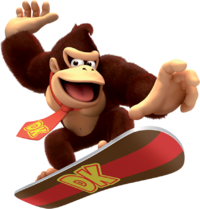
Donkey Kong, along with Birdo, Goomba, and a few others, were originally planned to appear as playable characters in Mario & Sonic at the Olympic Games, but were scrapped prior to the end-product for unknown reasons.[13]
Mario & Sonic at the Olympic Winter Games
Donkey Kong makes his Mario & Sonic debut in Mario & Sonic at the Olympic Winter Games, where he is a Power-type playable character in both the Wii version and the Nintendo DS version.
- Adventure Tours
In Icepeak, Mario, Sonic, and Toad find Donkey Kong crying due to one of his bananas having fallen in a deep ledge which he can't reach. Silver then comes and uses his psychic powers to bring the banana back to him. Donkey Kong thanks Silver and challenges him to Moguls. When Silver finally defeats him, Donkey Kong joins the group.
Toad tells him that there's a pole back in Polastraits. There are also obstacles on the pole, such as ice and bombs. When the ape presses the button on the pole, a bridge forms. Later in Icepeak, Donkey Kong meets Vector, who challenges him to a match of Short Track 500m. After beating Vector, Donkey Kong wants him to join the group, to which Vector agrees.
Mario & Sonic at the London 2012 Olympic Games
Donkey Kong returns as a playable Power-type character in the Wii version of Mario & Sonic at the London 2012 Olympic Games, where he appears in the opening with the other athletes as well as competing in Beach Volleyball. A Mii outfit based on Donkey Kong can be unlocked, and Donkey Kong also appears as a character that can be spoken to in London Party mode in order to play minigames and earn stickers.
In the Nintendo 3DS version, Donkey Kong is included in the Wild Ones group, alongside Bowser, Knuckles, and Vector, meaning that he is only playable in certain Events. In the story mode, Donkey Kong challenges Omega after he ruins his banana, and in the process manages to remove the chip from him that was causing him to rampage. Tails and Espio then explain to Donkey Kong about Bowser and Dr. Eggman's plan to use the Phantasmal Fog to stop the Olympic Games, and Donkey Kong tells Omega that he will forgive him if he helps stop Dr. Eggman. Omega agrees and heads off with Tails and Espio while Donkey Kong stays behind to keep an eye on ExCeL London. Donkey Kong later appears to support Mario, Luigi, Sonic, and Tails when they face Bowser and Dr. Eggman, having helped Knuckles and Vector clear the fog from Horse Guards Parade, and later appears at the opening ceremony. Donkey Kong also appears in the bonus episode Bowser's Blues, where Magikoopa tricks Donkey Kong into setting up a match for Bowser using some bananas and a Thwomp. After Bowser wins the match, Magikoopa takes Donkey Kong to find some real bananas. A badge of Donkey Kong can also be obtained from the badge machine.
Mario & Sonic at the Sochi 2014 Olympic Winter Games
Donkey Kong returns in the fourth installment as a Power-type playable character once again.
Mario & Sonic at the Rio 2016 Olympic Games
Donkey Kong returns in Mario & Sonic at the Rio 2016 Olympic Games and is once again a power-type. In the Nintendo 3DS version, he is exclusive to Boxing and Beach Volleyball, as well as their Plus versions.
In Mario & Sonic at the Rio 2016 Olympic Games Arcade Edition, he is also a Power-type playable character, having excellent power, average speed, and below average technique. In the Japanese version, he must be unlocked with Aime card functionality.
Mario & Sonic at the Olympic Games Tokyo 2020
Donkey Kong once again returns as a playable character in Mario & Sonic at the Olympic Games Tokyo 2020. He is once again a Power type. However, unlike most of the playable characters, DK does not wear clothing appropriate to the events he competes in.
He also appears in the arcade version, where he is also a Power-type playable character, added on August 5, 2020. He retains his statistics from the arcade version of the previous installment.
Mario Sports Mix
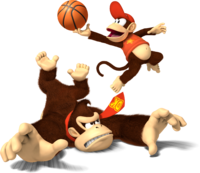
Donkey Kong appeared in Mario Sports Mix, where he was classified as a Powerful type character. While his technique is average, along with a very high power stat, Donkey Kong's speed is quite slow. His stage court is DK Dock.
Donkey Kong's special shot involves slamming the ground (which would briefly stun opponents) and then aiming the ball/puck at the goal, or at an opposing player. In Dodgeball, Donkey Kong can repel dodgeball attacks by spinning his body while having his arms stretched out. However, this defensive maneuver is rendered useless when the dodgeball is equipped with an item.
Fortune Street
Donkey Kong appears as an opponent in single player mode in Fortune Street, but he is playable in multiplayer. He is a Rank D opponent, which means he spends less investing in his property than most characters spend on their properties.
Super Mario series
Super Mario Maker
If the player scans the Donkey Kong amiibo on the Wii U GamePad while the game Super Mario Maker is running, they will be granted access to a Mystery Mushroom that, once collected by Mario, transforms him into Donkey Kong. He can become playable afterwards; much of his animations are based on the ones from Donkey Kong Country, while the sound effects that are heard during some of his actions, such as falling into a pit or clearing the level, are from the arcade version of Donkey Kong.
Super Mario Odyssey
An 8-bit Donkey Kong from the original Donkey Kong appears as an obstacle in Super Mario Odyssey. In A Traditional Festival! of the Metro Kingdom, Mario has to traverse through a lengthy 2D stage while Donkey Kong tosses barrels down slanted beams, similar to 25m. Once Mario reaches him, he can defeat Donkey Kong by hitting all four ? Blocks underneath him. He also appears in a 2D segment in the Darker Side during Long Journey's End. The entirety of Metro Kingdom's city, New Donk City, is meant to be a tribute to the Donkey Kong series, as it features various references to the original arcade title and the Donkey Kong Country games. A graffiti painting of Donkey Kong's original artwork can also be seen in the city.
Mario Sports Superstars
Donkey Kong appears as a playable captain character in Mario Sports Superstars. In most sports, he is classified as a Power type character, giving his shots more power (and thus speed), as well as giving him more stamina in horse racing. In golf, DK's default drive is 224 yards, and his shots travel slightly low in a draw trajectory.
Mario + Rabbids Kingdom Battle
Mario + Rabbids Kingdom Battle features a boss named Rabbid Kong, a large, ape-like Rabbid that strongly resembles Donkey Kong, right down to wearing his signature necktie. A figure of Donkey Kong on a girder appears in the introductory cutscene, as well.
DK himself was added as a playable character in the Donkey Kong Adventure story expansion pack in June 2018. This pack sees DK joining forces with Rabbid Peach and Rabbid Cranky, and taking on Rabbid Kong and his army. As a playable character, he has 280 health points. His dash attack is called Grab & Launch, which allows Donkey Kong to pick up allies, enemies, cover blocks, or sentries, move to another cell and launch them. This also can cleanse an ally overcome by a Super Effect. Donkey Kong's primary weapon is the Bwananarang, which is a mid-range weapon that is capable of hitting multiple targets in a row without cooldown. His secondary weapon is a DK Ground Pound, which is a targeted attack that affects all enemies within the attack's cylindrical area, regardless of cover. His primary technique is Hairy Eye, a mid-range reaction shot that is dealt to the first enemy to move within Donkey Kong's line of sight. His secondary technique is Magnet Groove, which draws enemies towards DK, getting them away from cover.
Dr. Mario World
Donkey Kong makes his Dr. Mario series debut in Dr. Mario World, in which he is known as Dr. Donkey Kong in that game, where he is equipped with a stethoscope and an armband. He was made available as a playable character in Dr. Mario World on October 31, 2019 when World 9 was first available. He is also available as a special stage reward in World 25.
In stage mode, Dr. Donkey Kong's skill is to eliminate objects in a 3x3 range. The way the skill works is that after it is activated, Dr. Donkey Kong will pound his chest and then a target will move around the stage. By tapping the screen, the targeted objects within range will be eliminated with a DK Barrel. Prior to version 2.3.0, the target moves in a predetermined direction in a cycle, but since that version, the target moves slower and in random directions orthogonally. It is possible to hit a target that do not contain any objects. In versus mode, Dr. Donkey Kong's skill is to instead send a row (level 1 and 2) or two rows (level 3 to 5) of viruses to the opponent's play area, in which the current stage objects are pushed down (red arrows act as a warning when this skill is activated by the opponent). This skill is not affected by the opponent's innate defenses, but it has a chance of being blocked by Ant Trooper's effect should the opponent have it equipped.
Paper Mario: The Origami King
In Paper Mario: The Origami King, a papier-mâché model of Donkey Kong's head known as the Jungle King Mask can be seen in the staff room of Shogun Studios among two others of a Goomba Mask and Samus's helmet. When worn, Mario will beat on his chest while Bob-omb describes the sound with words that rhyme with "Kong".
The Super Mario Bros. Movie
- “I don't need anything special to break EVERY BONE in your tiny body!”
- —Donkey Kong, The Super Mario Bros. Movie
Donkey Kong appears in The Super Mario Bros. Movie. He lives in the Jungle Kingdom and has a slightly changed design in the movie which, according to Shigeru Miyamoto, is intended to accentuate his comical personality. As a result, he resembles his original design from the Donkey Kong arcade game while also being a combination of his current modern design. The film debuts a Fire form of Donkey Kong (not counting Fire Mini Donkey Kong in Mario vs. Donkey Kong 2: March of the Minis) when he obtains a Fire Flower.[14] He is voiced by Seth Rogen in the English version of the film and Kōji Takeda in Japanese.
Donkey Kong is first mentioned by Cranky Kong, who challenges Mario to duel against him as a means to decide whether or not he will lend the Kong army to Princess Peach to aid the Mushroom Kingdom in defeating Bowser. During the duel, Donkey Kong heavily excels Mario in combat and almost defeats him before being brought to his own defeat by Mario then turned into a cat. Later, he joins the Kongs' kart-riding army against Bowser's own, and ultimately falls from the Rainbow Road alongside Mario into a body of water below where he almost drowns, but then is saved by Mario. Both are eaten by a Maw-Ray, but are able to escape using a Rocket Barrel from Donkey Kong's wrecked kart. Donkey Kong later advances alongside Mario through the Mushroom Kingdom to reach Bowser and Princess Peach's wedding, and saves the to-be-sacrificed captives from being submerged in lava. In the final act of the film, Donkey Kong exchanges blows with Bowser in Brooklyn alongside Peach. Bowser manages to overpower them and nearly kills Donkey Kong until Mario intervenes. After Bowser and his forces are defeated, Donkey Kong and the others are celebrated as heroes of Brooklyn.
Other appearances, cameos, and references
Donkey Kong appears briefly at the beginning of a commercial for Mario's Cement Factory, where he flings a burning barrel at Mario who narrowly dodges.[15]
The results screen for the NES version of Tetris features Donkey Kong as part of a band composed of himself, Bowser, Link, Pit, Mario, Luigi, Peach, and Samus Aran. He is playing the marching bass drum with his fists. Donkey Kong in particular appears when the player has completed height 3 of Game B's ninth level.
Donkey Kong has made a few appearances outside the extended Super Mario franchise. In Banjo-Tooie, for the Nintendo 64, Goggles is playing with a Donkey Kong doll. His name also appears as an answer to one of Grunty's questions in either the Tower of Tragedy or the final battle. In GoldenEye 007, another game developed by Rare, Donkey Kong's face can be seen on a mountain in the first mission of the game, the Dam.[16] In both this game and its spiritual successor Perfect Dark which was also developed by Rare, there is an unlockable cheat called "DK Mode". This cheat will make it so that all characters in those games will have a similar body shape to Donkey Kong, with a larger head and arms extending all the way to the ground so as to resemble Donkey Kong's primal posture. He also appears in Picross NP Vol. 8 as one of the figures that must be cleared.
At E3 2001, three Donkey Kong series titles were unveiled, Diddy Kong Pilot, Donkey Kong Coconut Crackers, and Donkey Kong Racing. All three of these games were eventually canceled due to Nintendo selling Rare to Microsoft, causing them to lose the rights to the Donkey Kong franchise. He was planned as a playable character in Diddy Kong Pilot and presumably Donkey Kong Racing, as he can be seen racing on a Rambi and a Zinger in different parts of the trailer. He is only playable via hacking in the leaked build of Diddy Kong Pilot.
Donkey Kong is a playable character in the canceled 2003 build of Diddy Kong Pilot. He is a member of Team Kong and has high weight and speed but medium acceleration. He was later replaced by Bottles in the final build of this iteration, Banjo-Pilot, where his groaning sound effect even remained intact with Mumbo Jumbo.
A skeleton named Bink from Mario & Luigi: Superstar Saga strongly resembles Donkey Kong, although this quirk was not carried over to that game's remake. Bink even throws barrels and eats bananas. While Donkey Kong himself does not appear in Yoshi's Woolly World and Poochy & Yoshi's Woolly World, a pattern based on him, named Donkey Kong Yoshi, is featured via amiibo.
Donkey Kong also appears in Skylanders: SuperChargers under Turbo Charge Donkey Kong. He appears alongside Bowser with a special figurine sold exclusively in the Wii U starter pack. However, due to an agreement between Nintendo and Activision, they are playable only on the Nintendo versions of the game. He also appears in the Wii U and Switch versions of Skylanders: Imaginators.
Outside of video games, Donkey Kong appears as a property in Nintendo Monopoly. He takes the place of Marvin Gardens and costs $280. Also, a monster truck based on Donkey Kong competed in Monster Jam from 2007 until 2010.
Donkey Kong also makes an appearance in the film Pixels. Aside from appearing in gameplay of the Donkey Kong arcade game, he appears on Earth as a clone created by aliens. In the film, the clone throws pixelated barrels at protagonist Sam Brenner (played by Adam Sandler) in a location very much like 25m. Brenner manages to avoid the barrels, defeat Donkey Kong, and rescue the Kong's hostages (who were positioned in the same location that Pauline was in Donkey Kong).
In the Super Mario Mash-up in Minecraft, Donkey Kong appears as a playable skin.
General information
Physical appearance
- “She came to have lunch with DK! Big, tall with lots of muscles DK! Not the half-pint version.”
- —Diddy Kong, Ape Foo Young
Donkey Kong is a Kong resembling a gorilla who sports a burly physique; in addition to having particularly large pecs, biceps and triceps, he is noted to weigh 800 pounds (363 kg) according to the talking Microphone that serves as the announcer for the fight against King K. Rool in Donkey Kong 64, as well as having the traditional large feet of primates with opposable thumbs. Donkey Kong also has brown fur, with the fur on his head being distinctly shaped to the point of looking like a hairstyle. As of Donkey Kong Country: Tropical Freeze, his fur has also consistently sported a realistic texture. The shade of brown his fur is colored, however, has been inconsistent between games, being either a lighter shade or its original darker shade. Donkey Kong wears only a single item of clothing: a red necktie with the "DK" logo printed on it in yellow from Donkey Kong Country 2: Diddy's Kong Quest onwards.
Within the Super Smash Bros. series, Donkey Kong's appearance has changed. In Super Smash Bros., Donkey Kong was somewhat cartoonish in appearance, though his design did not originate from a specific Super Mario or Donkey Kong game. In Super Smash Bros. Melee, Donkey Kong gains a darker color scheme, while his design appears to have more details; Donkey Kong is also shown with teeth, which are colored white. In Super Smash Bros. Brawl, Donkey Kong's fur is lighter in color, but it is further detailed. Donkey Kong's teeth are now yellowish in color. In Super Smash Bros. for Nintendo 3DS / Wii U, Donkey Kong's fur receives even more detail, akin to Donkey Kong Country: Tropical Freeze, though he has a more vibrant color scheme. In Super Smash Bros. Ultimate, Donkey Kong gains a more subdued color scheme, though not to the same extent as Melee or Brawl; additionally, his fur is slightly less detailed, though his necktie has simple detailing.
Throughout the Super Smash Bros. series, Donkey Kong has had eight alternate costumes to choose from; in Super Smash Bros. and Super Smash Bros. Melee, he has 5 costumes; in Super Smash Bros. Brawl , he has 6 costumes; lastly, in Super Smash Bros. for Nintendo 3DS / Wii U and Super Smash Bros. Ultimate, he has 8 costumes. Donkey Kong's first alternate costume gives him black fur, making him resemble his in-game sprite in Donkey Kong '94 and Donkey Kong Land; his second alternate costume gives him red fur, resembling his appearance in the original Donkey Kong; his third alternate costume gives him blue fur, resembling one of his alternate colors from Mario Golf and Donkey Kong 64's multiplayer mode; his fourth alternate costume gives him green fur, having no inspiration. In Melee, Donkey Kong's black costume receives a blue tie, his red costume receives a navy blue tie, and his blue costume receives a purple tie. In Brawl, Donkey Kong's black costume receives a yellow tie with green insignia and his blue costume receives a lavender tie; his green costume is much darker. Donkey Kong also gains a fifth alternate costume with white fur, later inspiring Super Kong's colors. In 3DS / Wii U, Donkey Kong's green costume regains its pre-Brawl color, while his sixth and seventh alternate costumes are introduced: the former gives Donkey Kong a light blue tie and golden brown fur, resembling one of his alternate colors from Mario Golf; the latter gives Donkey Kong a yellow tie and pink fur, resembling Junior (II)'s color in Donkey Kong Jr. Math.
In The Super Mario Bros. Movie, Donkey Kong has a more realistic look than his previous appearances. According to Shigeru Miyamoto, his design takes inspiration from his depictions prior to Donkey Kong Country in order to give him a more comical personality and design.[17] His body is also more detailed, similar to his appearance from the Super Smash Bros. games.
Speech
In the Donkey Kong arcade game, the original Donkey Kong only spoke in growls as he took Lady (or Pauline) on top of a construction site, as well as when ascending further up the structure upon Mario completing a level (except for 100m). Saturday Supercade depicted him with the ability to speak broken English in contrast to Donkey Kong Jr., his son. While he mainly verbalized realistic ape noises in-game provided by Mark Betteridge, the instruction manuals for the Donkey Kong Country, Donkey Kong Land and Donkey Kong Country 2: Diddy's Kong Quest showed that the current Donkey Kong has the ability to speak rather intelligently, which was also seen during the ending of Donkey Kong Country 3: Dixie Kong's Double Trouble!. Donkey Kong later spoke intelligibly in a few Club Nintendo comics as well as Super Mario-Kun. Donkey Kong first received voice acting in the 1998 computer-animated Donkey Kong Country television series, where he was portrayed by Richard Yearwood. Donkey Kong next received voice acting in Donkey Kong 64, where he was portrayed by Grant Kirkhope, a composer for Rare Ltd. and the Donkey Kong franchise. Here, Donkey Kong had a few lines where he spoke broken English while referring to himself in the third person. Grant Kirkhope would provide a mixture of cartoonish gorilla noises and actual words, including "Yeah!", "Cool", "Hey!", and "OK!". After 2006, Takashi Nagasako took over as Donkey Kong's voice actor, first heard in Mario Power Tennis, though he mainly provided him with cartoonish gorilla noises, although he is able to say his name, "Let's go!", and "Yeah, hey!" In current games where Donkey Kong is intended to speak in full sentences, there is in-game text to signify what he is saying. In the early Mario Party games, Mario Kart 64, Mario Kart Super Circuit, Mario Tennis, Mario Golf, as well as the Super Smash Bros. series, Donkey Kong is instead given chimpanzee screams and realistic gorilla roars, respectively, instead of a voice actor; Donkey Kong's voice clips from the N64 era use the Chimpanzee Screeches and Vocalizes from The Hollywood Edge Sound Effects Library.[18] In The Super Mario Bros. Movie, Donkey Kong, as all other Kongs, is fully capable of speech and can normally talk to non-Kong characters, where he is portrayed by Seth Rogen.
Personality
In the games, despite his carefree lifestyle, Donkey Kong is a brave and friendly hero who highly cares for his friends and banana hoard, and becomes enraged if either are threatened. He is always keen to be helpful and use his strength whenever possible. The Mario vs. Donkey Kong series portray him as prone to temper tantrums if he doesn't get what he wants, which leads to him and Mario clashing when he steals the Mini Mario Toys and even kidnaps Pauline, though he does show remorse once Mario resolves the matter. Donkey Kong is also shown as more aggressive and willing to fight in Donkey Kong Jungle Beat.
Donkey Kong is inconsistently depicted as somewhat dim-witted; in Fortune Street, Toad remarks that Donkey Kong is the brawn while Diddy Kong is the brains, and he speaks in broken, third-person English for his few lines in Donkey Kong 64; however, in other appearances, particularly during the Donkey Kong Country series, DK speaks fluent English much like the other Kongs. In The Subspace Emissary, Donkey Kong is shown to be more cautious, sensing the danger of the Dark Cannon Bowser wielded and electing to get the impulsive Diddy Kong to safety. In Snake's codec conversation on Donkey Kong in Super Smash Bros. Brawl and Super Smash Bros. Ultimate, Otacon claims that Donkey Kong seems "pretty smart" for an ape.
In the TV series, Donkey Kong's personality is largely the same, albeit depicting him as lazy instead of carefree. Donkey Kong is shown to have a somewhat stronger moral back bone, as shown in I Spy with My Hairy Eye with his reluctance to use the Crystal Coconut to wish for more bananas until Diddy manipulated him into doing it. Donkey Kong also seems easier to startle and more sensitive overall, but maintains an aggressive wariness of King K. Rool, Kaptain Skurvy and their goons.
In The Super Mario Bros. Movie, Donkey Kong is portrayed as a fun-loving, sarcastic, arrogant, and relaxed character who enjoys his popularity, but also suffers from self-confidence issues when it comes to how his father Cranky Kong views him as a joke, as well as being heavily embarrassed at the fact he was defeated in battle and then had his life saved by Mario. He also throws a fit of rage when Mario calls him a "smash monkey", showing his frustration about being seen as nothing more than a mindless brute "who smashes things".
Powers and abilities
Unlike most characters, who have some kind of special power, Donkey Kong relies mainly on his brute strength. He sometimes has the title of "The strongest of the Kongs", though this claim may refer to his combat prowess instead of strength alone, as some Kongs like Chunky Kong and Sumo Kong are clearly larger and stronger than Donkey Kong. In the original Donkey Kong he had a seemingly unlimited supply of Barrels, and could throw them easily. This carried on to the Donkey Kong Country games, where he can pick up and throw Barrels with ease. Also in Donkey Kong Country, he can defeat certain enemies that Diddy Kong cannot hurt with a single jump. In Donkey Kong: Jungle Beat, his strength is shown yet again, it makes him so strong that when he claps, a sound-wave is produced, which is his main attack throughout the game. In the ending of Donkey Kong Country Returns, Donkey Kong is shown to be strong enough to knock the moon out of its orbit and into the planet's atmosphere with a single punch (though the fact he was falling towards it at an alarming speed may have helped with it).
Donkey Kong also appears to either immune or highly resistant to hypnosis since the Kalimba Tiki was unable to hypnotize him when it was easily able to do so to other animals on the island. In Donkey Kong 64, he has a personal weapon, the Coconut Shooter, and has a special ability called Strong Kong which allows him to become invincible and use up more Crystal Coconuts the longer he maintains the form. Donkey Kong also has some skill with musical instruments, to the point that he can even weaponize music and song in combat. This is demonstrated in Donkey Kong 64, where Donkey Kong is talented in playing bongos and uses it to solve puzzles and attack surrounding enemies; the ability of playing bongos is also shown in the Donkey Konga games. In the Mario Strikers series, Donkey Kong is shown to wield electric powers, exerting bolts of lightning during his Super Strike and Mega Strike.
Though his size and weight may suggest otherwise, Donkey Kong is deceptively fast and agile; in Mario Strikers: Battle League, he break dances after scoring a goal and performs acrobatics while vine swinging in his victory scene. In Donkey Kong: Jungle Beat he is shown to be very proficient in hand to hand combat, delivering a vast amount of fast punches and kicks in a few seconds and is quick in countering the attacks he dodges, enabling him to contend with and defeat master martial artists like Karate Kong and Ninja Kong or physically stronger opponents like Sumo Kong. DK's speed and agility have also been consistently demonstrated throughout his appearances in the Super Smash Bros. franchise.
Identity
- Main articles: Cranky Kong#Identity confusion and Donkey Kong Jr.
According to various pieces of official media, starting with Donkey Kong Country, the Donkey Kong that appears in the titles prior to Donkey Kong Country, such as Donkey Kong, Donkey Kong Jr., Donkey Kong 3 and the Game Boy Donkey Kong, goes on to age and become Cranky Kong, passing down his name to the current and modern Donkey Kong, his grandson. Some sources would go on to imply that the Donkey Kong that appeared in games after Donkey Kong Country is a grown up Donkey Kong Jr.[19][20]; this was later contradicted in a 2017 Prima Games book that establishes Donkey Kong Jr. as the father of Donkey Kong and son of Cranky Kong.[21] The relationship between Cranky Kong and Donkey Kong has also been contradicted on occasion, between being his father (as seen mostly in Donkey Kong 64)[22] and being his grandfather.[23]
Relationships
Friends
Diddy Kong is Donkey Kong's "little buddy" who looks up to him. Diddy Kong has gone on many adventures with his best friend (with DK showing excitement at having another adventure with his friend when selected as his ally character in Super Mario Party), and the two often look out for each other, sharing a brotherly bond. In sports, Diddy Kong is often Donkey Kong's default partner. Diddy has rarely been suggested as a relative of DK's, though most sources do not claim that they are related.
Dixie Kong is one of Donkey Kong's closest friends, sometimes hanging out with him and Diddy Kong. She actively helped rescue him when he is kidnapped and joined him in retaking Donkey Kong Island from the Snowmads. Donkey Kong seems to act like a big brother to Dixie, similar to how he is with Diddy. He was very defensive of her when she was antagonized by a Dry Bones in Mario Super Sluggers. Dixie does show minor exasperation with DK when he is rash and stubborn, but they nonetheless have a close friendship.
Funky Kong is another one of Donkey Kong's recurring friends. The two share a good friendship, with Funky referring DK by the nickname "Donkey-dude". Though he prefers not adventuring, Funky does support Donkey Kong by giving him either transportation or weaponry, or acting as a shopkeeper.
Relatives
Cranky Kong is Donkey Kong's crabby and constantly rambling grandfather. He also originally had the name Donkey Kong until he turned it over to his replacement, and has not resumed the title since (with the sole exception being re-releases such as games in the Game & Watch Gallery series). He finds a way to help DK and his friends in their adventures, though it usually entails giving out advice or valuable items for a price. Although he frequently gets frustrated with DK's slow-witted nature, he does nonetheless look out and care for him. In Tropical Freeze, their relationship is shown in the most friendly; Cranky attends his grandson's birthday party, and their Kong POW shows them doing a fist bump. In the Donkey Kong Adventure, Donkey Kong works with a Rabbid counterpart of Cranky.
In the TV series, Cranky acts as a direct mentor to Donkey Kong, but still gets angry with him easily. Regardless, the two care about each other as family as shown in Message in a Bottle Show where the two hugged each other, although they may be loathe to admit it at times. Despite his low patience, Cranky has high faith in DK and views as the best hope for the well-being of Kongo Bongo and admits when Donkey Kong actually has a good idea.
Love interests
Candy Kong is one of Donkey Kong's closest friends who others believe he will marry one day, although he is not ready to settle down in Candy Kong's opinion. The Rarewhere website suggests that the two have known each other since childhood.[24] According to Super Smash Bros. Brawl, the idea of Candy being DK's girlfriend is only a rumor, which may be due to the fact Donkey Kong seems to spontaneously show romantic interest in Pauline. In Rare-developed games, DK tends to keep a framed photograph of Candy in his home. To explain Candy Kong's absence in later games, one official review of Donkey Kong Land 2 states that she broke up with Donkey Kong,[25] although the Donkey Kong 64 manual suggests otherwise.[26]
In the TV series, Donkey Kong and Candy Kong are dating, but their affection tends to be very on-and-off. Donkey Kong is blindly in love with Candy even when she dismisses him, as she often gets angry with him for his foolishness as shown in several episodes. Candy even occasionally expresses romantic interest in Bluster Kong instead.
Rivals
Donkey Kong and Mario have had a rivalry for some time. The rivalry is witnessed in the Mario vs. Donkey Kong series. However the rivalry is friendlier in spin-off games, as implied in Super Smash Bros., and in Solid Snake's codec conversation from Super Smash Bros. Brawl. Aside from their rivalry, Donkey Kong is good friends with Mario and gets along with him and his friends in some games such as the Mario Party series. Though the current Donkey Kong is large, he is actually quite a bit younger than Mario. Although Mario did fight Donkey Kong's grandfather in the original Donkey Kong game, Cranky Kong admits that Mario is a true video game hero and even looks back at his nostalgic antics with a fond respect. Donkey Kong and Mario do not seem to hold grudges against one another in spite of their occasional conflicts. One of the evident facts about this is whenever a player lands on a DK Space in the Mario Party series, Donkey Kong will reward them with coins and stars. Another sign of Mario and Donkey Kong's friendship is how quickly Mario forgives a remorseful DK in the Mario vs. Donkey Kong series, even giving him a toy a few times.
Donkey Kong displays good friendships with characters from the Sonic franchise. He has a friendly rivalry with Knuckles the Echidna and Vector the Crocodile. During the opening of Mario & Sonic at the Olympic Winter Games, Donkey Kong, as a hockey goalie, thwarts Knuckles' shot. In Adventure Tour, Donkey Kong quickly establishes good rapport with Vector and Silver the Hedgehog. In London, Silver and Donkey Kong compete together in Volleyball, while Donkey Kong, Knuckles, and Vector work together clearing out the fog in the wrestling venues, with Vector offering a detective job to DK. In Rio games, Donkey Kong and Knuckles accuse each other of cheating after being deceived by two Miis dressed as Mario and Sonic. Following their losses in the Boxing Event, they make peace after realizing their misunderstanding. Big the Cat also invites Donkey Kong to outing. Donkey Kong has special victory animations with Knuckles and Vector in Sochi and Rio, as well as being shown flexing with Vector in Mario & Sonic at the Olympic Games Tokyo 2020.
Enemies
King K. Rool and his Kremlings are archenemies of Donkey Kong and the Kong Family. They have stolen DK's hoard often for unknown reasons and kidnapped him and his friends. However, Donkey Kong was willing to help a Kremling named K. Lumsy when he realized that he did not wish to harm the Kong Family. Even when the king and four colored Kritters join the Kongs to form the DK Wilds, their antagonism still shows. In Super Smash Bros. Ultimate, King K. Rool's trailer is called "The Rivals" as a reference to the enmity between him and Donkey Kong. In the show, the feud is still the same. Donkey Kong enjoys giving the Kremlings beatings, causing them to have great fear and apprehension of him.
The Tiki Tak Tribe and the Snowmads are other adversaries to Donkey Kong, who has personal grudges with the groups for stealing all the bananas on Donkey Kong Island, including the ones in his hoard, and exiling him and his friends while conquering their home, respectively.
Other relationships
Pauline was kidnapped by both the original Donkey Kong in the Arcade, Game & Watch, and Game Boy games, and the current Donkey Kong in the Mario vs. Donkey Kong series. The original Donkey Kong's motive was revenge against Mario for not being a good pet owner, while the current Donkey Kong had two real different variations of the kidnapping. In March of the Minis, it was due to his perceived rejection of his feelings in favor of Mario, and took Pauline away to shower her with gifts. In Mini-Land Mayhem!, Donkey Kong just missed having the free Mini Pauline that was given to the first 100 guests of the theme park, so he takes the real Pauline instead. Although the current Donkey Kong has ultimately proven to have harmless intentions, Pauline showed constant fear of his temper and anger in Mini-Land Mayhem!. Despite this, they remain on friendly terms, and Pauline is generally key to soothing his anger issues. They are even known to work alongside each other, first in Minis March Again! where the "kidnapping" was made to test the current model of Mini Marios, and later in Tipping Stars, where Donkey Kong "kidnapped" Pauline to simply to lure Mario to a surprise party.
In the Donkey Kong Adventure story expansion pack for Mario + Rabbids Kingdom Battle, after DK, Rabbid Cranky, and Rabbid Peach manage to defeat Rabbid Kong, he turns over a new leaf after seeing the generosity from Rabbid Peach. When Rabbid Peach and Beep-0 leave for the Mushroom Kingdom, the group take multiple selfies together in honor of their newly formed friendship.
Donkey Kong also has had acquaintance with Wario. In Mario Party, they are shown doing poses and both specialize in strength. In Mario Superstar Baseball, they are on the same team. Donkey Kong even tries to give Wario a fist bump for the latter's home run, only to unintentionally pound Wario into the ground. Often, Wario has the same demeanor with Donkey Kong as he does with everyone else, but to some degree sees him as a powerful asset on his side.
Profiles and statistics
Donkey Kong's official profiles often characterize him as the "king of the jungle" and discuss how he is both a heroic adventurer and the laid-back leader of the DK Crew. In spinoffs he is typically a heavyweight power character with decent speed. His emblem in the spin-offs are his initials.
Portrayals
- Soupy Sales (1983, the first portrayal of Donkey Kong overall)
- Mark Betteridge (1994–1995)[27]
- Chris Sutherland (1994, when failing a Bonus Level)
- Charles Martinet (1994, Mario in Real Time)
- Richard Yearwood (1997-2000)
- Sterling Jarvis (1997-2000, singing voice)
- Grant Kirkhope (1999–2001, voice clips recycled from 2003-2010)
- Takashi Nagasako (2004-present)
- Seth Rogen (2023 film)
Quotes
Donkey Kong Country
All quotes are from the instruction booklets, with some narration.
- ""OK, little buddy," Donkey had said in his patronizing voice. "As part of your hero training, you've got to stand guard tonight over my bananas... I'll relive[sic] you at midnight, so try and stay awake until then!""
- ""Keep it down!!" he growled."
- "Morning already... I slept through my watch!"
- ""What 'cha do that for?!" Donkey Kong asked, knowing full well that Cranky was prone to cuffing him at every whim."
- ""Diddy... gone... My little buddy..." he murmured to himself."
- ""The Kremlings will pay!" he raged. "I'll hunt them down through every corner of my island, until I have every last banana from my hoard back!""
- "Diddy's obsession with being like me has gone too far! He may be a long way from a true video game hero, but he had the guts, the reflexes, the heart..."
- ""What do you know about adventuring, you flee-bitten old ape?" yelled Donkey Kong, edging closer and closer, braving Cranky's cane, until he was totally in his face. "I'm sick and tired of hearing about your boring, single screen adventures! Diddy's in trouble, my banana horde is gone, and I'm going to get them all back!""
Donkey Kong Country: Rumble in the Jungle
- "[Squawks the Parrot] always carries a high-powered flashlight. He led us through the caves and tunnels once before. Maybe he can help us again."
- "I can tell you where you're going. Right into that wall!"
- "Time for some masterful monkey maneuvers!"
- "Let the coward go. He's just a big windbag, like his ship!"
Donkey Kong 64
- "Yeah!"
- "Cool!"
- "Hey!"
- "Ok!"
- "What did Cranky mean about training? Donkey all confused..."
- "Yes, Donkey will help K. Lumsy!"
Donkey Kong Country TV Series
- "Banana-slamma!!"
- "Got any Banana Cream Pie?"
- "Hey Inka! Ring-a-ding-ding. It's me, DK, the future ruler of Kongo Bongo. We got business to discuss."
- "I would have called him something else, but you were present."
- "Aye aye, nose nose, throat throat, ablast me hardies, and shiver me tree trunks!"
- "Hmmm, to know everything, I must give up everything... HEY! Little buddy, I'm giving you my tie collection!"
- "Ohh... feels like I got the stuffing knocked out of me... Oh no! I did get the stuffing knocked out of me! Where's my stuffing?!"
- "Arr, you got me confused with someone else. I'm Donkey Kroc the pirate, arr, and I'm looking for Donkey Kong the (mimics monkey) ape."
- "That's not mine! Look, there's still a piece of banana inside! I never leave a banana bit! Can I have it?"
- "I've never known any problem that couldn't be solved with a little nap."
- "Help, Diddy! I've fallen, and I can't get up! Can you pass me a banana, little buddy?"
- "It's hard to believe anybody this cute could have everybody so mad at him."
- "It's the company's fault for making you want it so much."
- "Back off or I'll have to slam you."
- "It's more fun bein' in one of these biplanes than on top of some skyscraper!"
- "And I say HE'S the one with problems"
- "It's the dreaded..daba..blaba..curse of double dabble wa...doo be doo!"
- "Then let's give them something to really listen to."
- "I'll shower you in coconut cream pies!"
- "There there, little buddy."
Mario Super Sluggers
- "Ook! Ook! (I was wondering when you'd arrive.)"
- "Ookity ook! OOOOK! (Bowser Jr. was here a little while back.)"
- "OOK OOK OOK! (He dropped our log bridge and then ran off!)"
- "Ook! Hooo ook! (I wanted to chase him down, but not even I can jump across that gap.)"
- "Oook? Oooo... (This is pathetic! What am I gonna do now?)"
- "Ook ook! (No way I can jump all the way over to that side)"
- "Mmm... Ook? (If only there was some way to cross...)"
- "OOK! Ook ook! (Banana splits! Could it be...)"
- "Ookie ook! (It's a Barrel Cannon! Ook! ...I mean, hooray!)"
- "Oooook! (Looks like Funky Kong has been busy.)"
- "Ook! Ook! (I can use this to get over that gap! See you on the other side!)"
- "OOK! OOK OOK! (I'm coming for you, Bowser Jr.!)"
- "Ook. (Who do you think you are? You'd best stay away from Dixie Kong!)"
- "Ook? (Are you OK, Dixie Kong?)"
- "Ook OOK? (He's going to do WHAT?)"
- "Ook. Ook. (He's trying to take it? This will not stand!)"
- "Ook ook. (It's no use... I'm clueless.)"
- "Harooo! (No! It's my ballpark. I should take care of it myself.)"
- "Hoot hoot ook! (Don't take this wrong, but I need to see what you're made of.)"
- "Oooookie ooo! (It's settled! I'm leaving it up to you!)"
- "Ook ook ook! (If you find barrels or boxes, I'll crush 'em with a hand slap.)"
- "Ooooooooooooook! (Let's send Bowser Jr. packing!)"
- "Ook ook! (There's a vine here. I love vines!)"
- "Ook! (Sure did! Give us the lowdown on the stone tablet!)"
- "Ook! Ook! (Let's go! We have to get the stone tablet back!)"
- "Ook. Ook. (Tiny Kong! You'll pay for this, Bowser Jr.!)"
- "Ooka ooka oooo! (Let's move! We have to help!)"
- "Ook ook! OOOOOOOK! (Coconut thunder! We've picked up every player in the area!)"
- "Ookookook. (Dixie Kong, Tiny Kong, Funky Kong, Baby DK...)"
- "Ook ook! (The Kritters, King K. Rool, and my best pal, Diddy Kong.)"
- "Ook ook! Ooooook! (Nothing! I hate finding nothing.)"
The Super Mario Bros. Movie
- "I'm D.K.! I'm Donkey Kong!"
- "Hi, Dad!"
- "Dad, wave back!"
- "What do you mean? They like it! It's what they came here for! Dancing pecs!"
- "I don't need anything special to break EVERY BONE in your tiny body!"
- "It is on... like Donkey Kong!"
- "Had enough?"
- "HA! You got the cat box! Oh my- [sighs] I'm sorry. I'm sorry. Okay. Now you die."
- "Not… even… close…"
- "I hate you."
- "See ya!"
- "Stop talking! I don't want the last thing I hear, before I die, to be your..."
- "I. AM. MORE. THAN A GUY. WHO SMASHES THINGS!!!"
- "Now we're even!"
- "Yes I do!"
- "Yes! Fire!"
- "This is fun!"
- "Loser!"
- "Cool raccoon suit!"
- "No time now. Definitely later!"
- "HA! He got the Blue Mushroom!"
- "Aww, bring it in!"
Voice samples
| File info |
| File info |
| File info |
| File info |
| File info |
List of appearances by date
| Title | Description | Original release date | System/format |
|---|---|---|---|
| Donkey Kong | Boss | 1981 | Arcade, Nintendo Entertainment System |
| Donkey Kong | Boss | 1982 | Game & Watch |
| Donkey Kong Jr. | Non-playable character (by name) | 1982 | Arcade, Nintendo Entertainment System |
| Donkey Kong Jr. | Non-playable character (by name) | 1982 | Game & Watch |
| Donkey Kong II | Non-playable character (by name) | 1983 | Game & Watch |
| Donkey Kong Jr. + Jr. Sansū Lesson | Non-playable character (by name) | 1983 | Family Computer |
| Donkey Kong 3 | Antagonist | 1983 | Arcade, Nintendo Entertainment System |
| Donkey Kong Jr. Math | Non-playable character (by name) | 1983 | Nintendo Entertainment System |
| Punch-Out!! | Cameo as member of crowd | 1984 | Arcade |
| Donkey Kong 3: Dai Gyakushū | Antagonist | 1984 | NEC PC-88, NEC PC-6601, Sharp X1 |
| Donkey Kong 3 | Antagonist | 1984 | Game & Watch |
| Super Punch-Out!! | Cameo as member of crowd | 1984 | Arcade |
| Donkey Kong Circus | Playable character | 1984 | Game & Watch |
| Donkey Kong Hockey | Playable character | 1984 | Game & Watch |
| Donkey Kong Classics | Boss | 1988 | Nintendo Entertainment System |
| Tetris | Cameo | 1989 | Nintendo Entertainment System |
| NES Open Tournament Golf | Non-playable character (by name) | 1991 | Nintendo Entertainment System |
| Donkey Kong | Boss | 1994 | Game Boy |
| Donkey Kong | Boss | 1994 | Nelsonic Game Watch |
| Donkey Kong Country | Playable character | 1994 | Super Nintendo Entertainment System |
| Donkey Kong Land | Playable character | 1995 | Game Boy |
| Mario Clash | Cameo at 800,000 points | 1995 | Virtual Boy |
| Donkey Kong Country 2: Diddy's Kong Quest | Non-playable character | 1995 | Super Nintendo Entertainment System |
| Donkey Kong Land 2 | Non-playable character | 1996 | Game Boy |
| Donkey Kong Country 3: Dixie Kong's Double Trouble! | Non-playable character | 1996 | Super Nintendo Entertainment System |
| Mario Kart 64 | Playable character | 1996 | Nintendo 64 |
| Mario Party | Playable character | 1998 | Nintendo 64 |
| Super Smash Bros. | Playable character | 1999 | Nintendo 64 |
| Donkey Kong 64 | Playable character | 1999 | Nintendo 64 |
| Mario Party 2 | Playable character | 1999 | Nintendo 64 |
| Mario Artist: Paint Studio | Stamp | 1999 | Nintendo 64DD |
| Donkey Kong Country | Playable character | 2000 | Game Boy Color |
| Mario Party 3 | Playable character | 2000 | Nintendo 64 |
| Mario Kart: Super Circuit | Playable character | 2001 | Game Boy Advance |
| Super Smash Bros. Melee | Playable character | 2001 | Nintendo GameCube |
| Mario Party 4 | Playable character | 2002 | Nintendo GameCube |
| Donkey Kong Country | Playable character | 2003 | Game Boy Advance |
| Mario Golf: Toadstool Tour | Playable character | 2003 | Nintendo GameCube |
| Mario Kart: Double Dash!! | Playable character | 2003 | Nintendo GameCube |
| Mario Party 5 | Non-playable character Unlockable playable character (Super Duel Mode only) |
2003 | Nintendo GameCube |
| Donkey Konga | Playable character | 2003 | Nintendo GameCube |
| Mario vs. Donkey Kong | Boss | 2004 | Game Boy Advance |
| Donkey Kong Country 2 | Non-playable character | 2004 | Game Boy Advance |
| Donkey Konga 2 | Playable character | 2004 | Nintendo GameCube |
| Mario Power Tennis | Playable character | 2004 | Nintendo GameCube |
| Mario Party 6 | Non-playable character | 2004 | Nintendo GameCube |
| DK: King of Swing | Playable character | 2005 | Game Boy Advance |
| Yakuman DS | Non-playable character | 2005 | Nintendo DS |
| Donkey Konga 3: Tabehōdai! Haru Mogitate 50 Kyoku | Playable character | 2005 | Nintendo GameCube |
| Donkey Kong Jungle Beat | Playable character | 2005 | Nintendo GameCube |
| Mario Superstar Baseball | Playable character | 2005 | Nintendo GameCube |
| Mario Kart Arcade GP | Playable character | 2005 | Arcade |
| Donkey Kong Country 3 | Non-playable character | 2005 | Game Boy Advance |
| Mario Party 7 | Non-playable character | 2005 | Nintendo GameCube |
| Mario Kart DS | Playable character | 2005 | Nintendo DS |
| Mario Hoops 3-on-3 | Playable character | 2006 | Nintendo DS |
| Mario vs. Donkey Kong 2: March of the Minis | Boss | 2006 | Nintendo DS |
| Super Mario Strikers | Playable character | 2005 | Nintendo GameCube |
| Mario Kart Arcade GP 2 | Cameo | 2007 | Arcade |
| Mario Strikers Charged | Playable character | 2007 | Wii |
| Mario Party 8 | Non-playable character | 2007 | Wii |
| Donkey Kong Barrel Blast | Playable character | 2007 | Wii |
| DK: Jungle Climber | Playable character | 2007 | Nintendo DS |
| Mario Party DS | Non-playable character | 2007 | Nintendo DS |
| Super Smash Bros. Brawl | Playable character | 2008 | Wii |
| Mario Kart Wii | Playable character | 2008 | Wii |
| Mario Super Sluggers | Playable character | 2008 | Wii |
| New Play Control! Mario Power Tennis | Playable character | 2009 | Wii |
| Punch-Out!! | Non-playable character | 2009 | Wii |
| Mario vs. Donkey Kong: Minis March Again! | Boss | 2009 | Nintendo DSi |
| Donkey Kong Country Returns | Playable character | 2010 | Wii |
| Mario Sports Mix | Playable character | 2010 | Wii |
| Mario vs. Donkey Kong: Mini-Land Mayhem! | Boss | 2010 | Nintendo DS |
| Fortune Street | Playable character | 2011 | Wii |
| Mario Kart 7 | Playable character | 2011 | Nintendo 3DS |
| Mario Party 9 | Non-playable character | 2012 | Wii |
| Mario Tennis Open | Playable character | 2012 | Nintendo 3DS |
| Donkey Kong Country Returns 3D | Playable character | 2013 | Nintendo 3DS |
| Mario and Donkey Kong: Minis on the Move | Boss | 2013 | Nintendo 3DS |
| Donkey Kong Country: Tropical Freeze | Playable character | 2014 | Wii U |
| Mario Golf: World Tour | Playable character | 2014 | Nintendo 3DS |
| Mario Kart 8 | Playable character | 2014 | Wii U |
| Super Smash Bros. for Nintendo 3DS | Playable character | 2014 | Nintendo 3DS |
| Super Smash Bros. for Wii U | Playable character | 2014 | Wii U |
| Mario vs. Donkey Kong: Tipping Stars | Boss | 2015 | Wii U, Nintendo 3DS |
| Mario Party 10 | Playable character | 2015 | Wii U |
| Super Mario Maker | Playable character (Costume Mario) | 2015 | Wii U |
| Mario & Sonic at the Rio 2016 Olympic Games | Playable character | 2016 | Nintendo 3DS |
| Mario & Sonic at the Rio 2016 Olympic Games | Playable character | 2016 | Wii U |
| Mini Mario & Friends: amiibo Challenge | Playable character | 2016 | Wii U |
| Minecraft: Wii U Edition | Playable skin in the Super Mario Mash-up | 2016 | Wii U |
| Mario Party: Star Rush | Unlockable playable character | 2016 | Nintendo 3DS |
| Mario Sports Superstars | Playable character | 2017 | Nintendo 3DS |
| Mario Kart 8 Deluxe | Playable character | 2017 | Nintendo Switch |
| Minecraft: Nintendo Switch Edition | Playable skin in the Super Mario Mash-up | 2017 | Nintendo Switch |
| Mario + Rabbids Kingdom Battle | Playable character (Donkey Kong Adventure DLC) | 2017 | Nintendo Switch |
| Super Mario Odyssey | Cameo (original Donkey Kong) | 2017 | Nintendo Switch |
| Mario Party: The Top 100 | Non-playable character | 2017 | Nintendo 3DS |
| Donkey Kong Country: Tropical Freeze | Playable character | 2018 | Nintendo Switch |
| Minecraft: New Nintendo 3DS Edition | Playable skin in the Super Mario Mash-up | 2018 | New Nintendo 3DS |
| Minecraft (Bedrock version) | Playable skin in the Super Mario Mash-up | 2018 | Nintendo Switch |
| Mario Tennis Aces | Playable character | 2018 | Nintendo Switch |
| Super Mario Party | Unlockable playable character | 2018 | Nintendo Switch |
| Super Smash Bros. Ultimate | Playable character | 2018 | Nintendo Switch |
| Mario Kart Tour | Unlockable playable character | 2019 | Mobile |
| Dr. Mario World | Unlockable playable character | 2019 | Mobile |
| Mario & Sonic at the Olympic Games Tokyo 2020 | Playable character | 2019 | Nintendo Switch |
| Paper Mario: The Origami King | Cameo | 2020 | Nintendo Switch |
| Mario Golf: Super Rush | Playable character | 2021 | Nintendo Switch |
| Mario Party Superstars | Playable character | 2021 | Nintendo Switch |
| Mario Strikers: Battle League | Playable character | 2022 | Nintendo Switch |
Gallery
- For this subject's image gallery, see Gallery:Donkey Kong.
Donkey Kong
(American flier)
Names in other languages
Donkey Kong
| Language | Name | Meaning | Notes |
|---|---|---|---|
| Japanese | ドンキーコング[?] Donkī Kongu |
Donkey Kong | |
| Catalan | Donkey Kong (The Super Mario Bros. Movie)[?] | - | |
| Chinese (simplified) | 森喜刚 Sēnxǐ Gāng 咚奇刚[28] (since December 23, 2022) Dōngqí Gāng |
Literally "Forest Happy Kong" Transliteration of the Japanese name |
|
| Chinese (traditional) | 大金剛[29][30] Dàjīn'Gāng 森喜剛[31][32] (since Mario Party 9) Sēnxǐ Gāng 咚奇剛[28] (since December 23, 2022) Dōngqí Gāng |
Transliteration of the Japanese name Literally "Forest Happy Kong" Transliteration of the Japanese name |
|
| Dutch | Donkey Kong[?] | - | |
| Finnish | Donkey Kong[?] | - | |
| German | Donkey Kong Donkey[?] |
- | |
| Greek | Ντόνκυ Κονγκ[?] Donky Kong |
Donkey Kong | |
| Hebrew | דונקי קונג[?] Donki Kong |
Donkey Kong | |
| Hungarian | Donkey Kong (Template:Media link)[?] |
- |
|
| Italian | Donkey Kong[?] | - | |
| Korean | 동키콩[?] Dongki Kong |
Donkey Kong | |
| Portuguese | Donkey Kong[?] | - | |
| Romanian | Donkey Kong (Template:Media link, The Super Mario Bros. Movie)[?] |
- |
|
| Russian | Донки Конг[?] Donki Kong |
Donkey Kong | |
| Spanish | Donkey Kong[?] | - | |
| Thai | ดองกี คอง[34] Dong-ki Khong |
Donkey Kong |
Donkey Kong (Gladiator)
| Language | Name | Meaning | Notes |
|---|---|---|---|
| Japanese | ドンキーコング (戦士)[?] Donkī Kongu (Senshi) |
Donkey Kong (Warrior) | |
| Chinese (simplified) | 森喜刚 (战士)[?] Sēnxǐ Gāng (Zhànshì) |
Donkey Kong (Warrior) | |
| Chinese (traditional) | 森喜剛 (戰士)[?] Sēnxǐ Gāng (Zhànshì) |
Donkey Kong (Warrior) | |
| German | Donkey Kong (Gladiator)[?] | - | |
| Italian | Donkey Kong (gladiatore)[?] | Donkey Kong (gladiator) | |
| Korean | 동키콩(전사)[?] Dongki Kong (Jeonsa) |
Donkey Kong (Warrior) | |
| Portuguese | Donkey Kong (gladiador)[?] | Donkey Kong (gladiator) | |
| Spanish (NOA) | Donkey Kong (gladiador)[?] | Donkey Kong (gladiator) | |
| Spanish (NOE) | Donkey Kong (Gladiador)[?] | Donkey Kong (Gladiator) |
Trivia
- A Donkey Kong-like version of Grinder was originally planned for Super Mario World 2: Yoshi's Island, but is unused.
- Donkey Kong is one of the four base characters included in the Standard Edition (five in the Collector's Edition) of the Monopoly Gamer board game.
References
- ^ Mario Kart 64 (From Japanese to English) The Mushroom Kingdom (Retrieved August 15, 2018)
- ^ Super Smash Bros. Melee (From Japanese to English) The Mushroom Kingdom (Retrieved May 29, 2010)
- ^ 「1994年に発売された『ドンキーコング』(ゲームボーイ)を最後に、孫に“ドンキーコング”の名を譲り渡す。」 ("After the release of 'Donkey Kong' (Game Boy), he turned over the Donkey Kong name to his grandchild.") - Nintendo Online Magazine
- ^ a b Kohler, Chris (October 14, 2016). "Miyamoto Spills Donkey Kong’s Darkest Secrets, 35 Years Later Wired. Retrieved October 14, 2016
- ^ "Donkey Wrong" - An article about the origin of Donkey Kong's name. Snopes.com. 2011. (Retrieved June 28, 2012)
- ^ GamingHistorian (January 22, 2020). Gunpei Yokoi deposition, 1983. Twitter. Retrieved November 27, 2021.
- ^ Gaming Historian (September 29, 2021). How the Mario Characters Got Their Names. YouTube. Retrieved November 28, 2021.
- ^ "This could be considered plausible but Miyamoto blew his credibility by claiming that the character was inspired by the legend of Beauty And The Beast (a story with very few apes in it, when you come to think about it!)". Donkey Kong Jungle Action Special (Steve May), p. 21. Fleetway Publications. Retrieved January 23, 2022
- ^ Shesez (November 21, 2019). The Donkey Kong Country 25th Anniversary Interview Documentary (7m49s). YouTube. Retrieved August 8, 2023.
- ^ Shesez (November 21, 2019). The Donkey Kong Country 25th Anniversary Interview Documentary (9m47s). YouTube. Retrieved August 8, 2023.
- ^ Shigeru Miyamoto Interview. The Mushroom Kingdom. (Retrieved July 1, 2012)
- ^ https://www.nintendo.com/nes-classic/donkey-kong-developer-interview
- ^ Ripped character IDs for Mario & Sonic. (Retrieved on July 12, 2008)
- ^ Illumination (March 9, 2023). The Super Mario Bros. Movie | Final Trailer. YouTube. Retrieved March 10, 2023.
- ^ Nintendo - Mario's Cement Factory Video Game Commercial - 1983. YouTube. Retrieved July 23, 2022.
- ^ DK's cameo in Goldeneye 007
- ^ [1]
- ^ https://www.whosampled.com/sample/515022/Nintendo-Character-Sound-Effects-The-Hollywood-Edge-Sound-Effects-Library-Chimpanzee-Screeches-and-Vocalizes/
- ^ Scribes - April 25, 1999. Rareware Website Archive. Rareware.com. Retrieved April 13, 2017.
- ^ Donkey Kong Country web page. (April 13, 2017). Nintendo.co.uk. Retrieved April 13, 2017.
- ^ "Super Mario Kart is the only Mario Kart game to feature Donkey Kong Jr. Due to the success of Donkey Kong Country, all future Mario Kart entries featured Donkey Kong, who is actually Donkey Kong Jr.’s son, with Cranky Kong, aka Donkey Kong Sr., canonically being the character featured in the original Donkey Kong game. Makes sense, right?" - Playing With Super Power: Nintendo Super NES Classics eGuide, Super Mario Kart 16 Bits Tab.
- ^ "That darn Donkey has all the luck! His girl Candy waits around in her hut, always willing to offer her musical help to that undeserving son of mine and his fancy polygonal friends. Pah!" - Donkey Kong 64 instruction booklet, page 9 (among various in-game lines)
- ^ Gregg Mayles in a May 2017 Twitter post. Retrieved May 2, 2017.
- ^ DKC Trilogy Cast List. Rarewhere. Retrieved April 25, 2022.
- ^ Nintendo Magazine System (UK) #50, page 52. "You’d have thought that after retrieving his banana stash, Donkey Kong would be able to live out his days in peace and harmony with Candy Kong by his side. Unfortunately, she’s given him the push. And to make matters even worse, he’s been captured by those oh-so-pesky Kremlings!"
- ^ Donkey Kong 64 instruction booklet, page 9. "That darn Donkey has all the luck! His girl Candy waits around in her hut, always willing to offer her musical help to that undeserving son of mine and his fancy polygonal friends. Pah!"
- ^ Shesez (November 22, 2019). The Donkey Kong Country 25th Anniversary Interview Documentary (52m12s). YouTube. Retrieved January 17, 2023.
- ^ a b 部分角色的中文名稱變更通知, Nintendo HK. Retrieved December 23, 2022.
- ^ https://www.nintendo.tw/ds/ds_software2007.htm
- ^ https://www.nintendo.com.hk/wii/wii_software_2.htm
- ^ https://www.nintendo.com.hk/ssqj/adventure/index.html
- ^ https://www.nintendo.tw/mp9/adventure/index.html
- ^ Official website for Donkey Kong Planet
- ^ Thai version of the official trailer for The Super Mario Bros. Movie (November 30, 2022), YouTube. Retrieved December 9, 2022.
- Kongs
- Parents
- Magicians
- Pirates
- Captains
- Police officers
- Princes
- Playable characters
- Final bosses
- Amiibo with special editions
- DK: Jungle Climber characters
- DK: King of Swing
- Donkey Kong (game)
- Donkey Kong (Game Boy)
- Donkey Kong 3 enemies
- Donkey Kong 64 characters
- Donkey Kong allies
- Donkey Kong Barrel Blast characters
- Donkey Kong characters
- Donkey Kong Country characters
- Donkey Kong Country (television series)
- Donkey Kong Country 2: Diddy's Kong Quest characters
- Donkey Kong Country 3: Dixie Kong's Double Trouble! characters
- Donkey Kong Country Returns characters
- Donkey Kong Country: Tropical Freeze characters
- Donkey Kong Land characters
- Donkey Kong Land 2 characters
- Donkey Kong Jr.
- Donkey Kong Jungle Beat characters
- Donkey Konga
- Donkey Konga 2
- Dr. Mario World
- Fortune Street characters
- Heads-Up
- Hurling for Distance
- Itadaki Street DS characters
- LEGO Super Mario characters
- Mario + Rabbids Kingdom Battle characters
- Mario & Sonic at the London 2012 Olympic Games characters
- Mario & Sonic at the Olympic Winter Games characters
- Mario & Sonic at the Rio 2016 Olympic Games characters
- Mario & Sonic at the Sochi 2014 Olympic Winter Games characters
- Mario and Donkey Kong: Minis on the Move
- Mario Clash
- Mario Golf (Nintendo 64) characters
- Mario Golf (Game Boy Color) characters
- Mario Golf: Advance Tour characters
- Mario Golf: Super Rush characters
- Mario Golf: Toadstool Tour characters
- Mario Golf: World Tour characters
- Mario Hoops 3-on-3 playable characters
- Mario is Missing! characters
- Mario Kart 64 characters
- Mario Kart 7 characters
- Mario Kart 8 characters
- Mario Kart Arcade GP characters
- Mario Kart Arcade GP 2 characters
- Mario Kart Arcade GP DX characters
- Mario Kart: Double Dash!! characters
- Mario Kart DS characters
- Mario Kart: Super Circuit characters
- Mario Kart Tour characters
- Mario Kart Wii characters
- Mario Kart Wii trading cards
- Mario Party characters
- Mario Party 2 characters
- Mario Party 3 characters
- Mario Party 4 characters
- Mario Party 5 characters
- Mario Party 6 characters
- Mario Party 7 characters
- Mario Party 8 characters
- Mario Party 9 bosses
- Mario Party 10 characters
- Mario Party DS characters
- Mario Party-e characters
- Mario Party: Star Rush characters
- Mario Party Superstars characters
- Mario Party: The Top 100 characters
- Mario Power Tennis characters
- Mario Sports Mix characters
- Mario Sports Superstars characters
- Mario Strikers: Battle League characters
- Mario Strikers Charged characters
- Mario Super Sluggers playable characters
- Mario Superstar Baseball characters
- Mario Tennis (Nintendo 64) characters
- Mario Tennis Aces characters
- Mario Tennis (Game Boy Color) characters
- Mario Tennis Open characters
- Mario Tennis: Power Tour characters
- Mario Tennis: Ultra Smash characters
- Mario vs. Donkey Kong 2: March of the Minis
- Mario vs. Donkey Kong: Mini-Land Mayhem!
- Mario vs. Donkey Kong: Minis March Again!
- Mario vs. Donkey Kong: Tipping Stars
- NES Open Tournament Golf characters
- Saturday Supercade characters
- Super Mario Maker costumes
- Super Mario Odyssey bosses
- Super Mario Party characters
- Super Mario Strikers characters
- Super Smash Bros. amiibo line
- Super Smash Bros. fighters
- Super Smash Bros. Brawl fighters
- Super Smash Bros. Brawl stickers
- Super Smash Bros. Brawl trophies
- Super Smash Bros. for Nintendo 3DS / Wii U fighters
- Super Smash Bros. for Nintendo 3DS trophies
- Super Smash Bros. for Wii U trophies
- Super Smash Bros. Melee fighters
- Super Smash Bros. Melee trophies
- Super Smash Bros. Ultimate fighters
- Super Smash Bros. Ultimate spirits
- Super Smash Bros. series bosses
- The Super Mario Bros. Movie characters
- UNO Super Mario
- Yakuman DS
